

Series: The Ego Papers
| Recently five friends and I were studying the gospel of Matthew together. In the discussion time, I gained everyone's attention by announcing that I was god. No one was the least bit impressed! One by one each agreed that they, too, thought they were god! Each of us felt entitled and in charge of our lives and destinies. Our discussion led to a discussion of default religion in today's world. We could not each be god. We had to coexist so we'd negotiate boundaries with all the other gods. |
I often wonder how the one true God manages to rule over all the affairs of our planet when earth is packed with several billion anarchists each wanting to run his or her own life--each wanting to be "god."
I can see this deep-rooted delusion of wanting to be my own god repeatedly in my own life. It crops up often. The fact that I am a powerless and puny god frustrates me, but does not bring about my easy abdication in regard to the "ego on the throne" problem. Pride has two faces--outward arrogance or inward stubbornness--adding to the problem of us becoming humble persons.
I am aware that I know less and less about reality as I grow older. That makes me an even more inept tin god when it comes to running my own life, let alone in influencing others. Does this awareness of my true impotence drive me to the real God for help and strength? Not always! The core of self, and pride, runs very deep in my soul.
Our American culture still promotes the myth that one can achieve just about anything one sets his heart upon doing with his life. Compounding this is the false notion that we each have all sorts of "rights" we supposedly were born with. Our personal "happiness" is supposed to be more important than the well-being and fulfillment of spouse and family. The call to self-sacrifice for the good of the other, or the good of the nation, is fast fading away as a viable concept. It ought to be normative principle in a civilized society, and it once was in our nation not many years ago. Everyone today seems to ignore the fact that "we are all bundled up [together] in the bundle of the living" (1 Samuel 25:29). All our actions, public or private, affect everyone else for good or for ill. But who cares anyway?
In his commentary on Romans, James M. Boice lucidly describes the many ways we all try to hide from God. For instance, "religion" is but one invention of fallen men in our many attempts to redefine God into someone or something other than He really is. Our own view of history and our opinions about ourselves are flattering, neat and tidy compared to the way God sees us. The Lord's descriptions of our race and our continuous deterioration towards oblivion, tell quite a different story.
It seems natural for us all to live in deep denial about the real life and death and sin and judgment issues we ultimately must face whether we like it or not. Even dedicated Christians seem to readily adjust their behavior downward to the lax group norms of the present lukewarm church, irregardless of what God is asking of us. But, "there is no one hidden from His sight, but all things are naked and laid bare before the eyes of Him to whom we must give account." (Hebrews 4:13). "it is written: 'As I live, says the LORD, Every knee shall bow to Me, And every tongue shall confess to God.' So then each of us shall give account of himself to God." (Romans 14:11-12)
The New Testament calls this deep rooted desire we all have to run our own lives "THE lie." It is an old lie. It is the lie of the Garden.
Now the serpent was more cunning than any beast of the field which the LORD God had made. And he said to the woman, "Has God indeed said, 'You shall not eat of every tree of the garden'?" And the woman said to the serpent, "We may eat the fruit of the trees of the garden; "but of the fruit of the tree which is in the midst of the garden, God has said, 'You shall not eat it, nor shall you touch it, lest you die.'" Then the serpent said to the woman, "You will not surely die. "For God knows that in the day you eat of it your eyes will be opened, and you will be like God, knowing good and evil." So when the woman saw that the tree was good for food, that it was pleasant to the eyes, and a tree desirable to make one wise, she took of its fruit and ate. She also gave to her husband with her, and he ate. Then the eyes of both of them were opened, and they knew that they were naked; and they sewed fig leaves together and made themselves coverings. (Genesis 3:1-7)
It is too late for us to say "no" to the very first overture the tempter made to our race. The fatal disease of sin and death was something we have all inherited. It is naive to suppose that this deadly disease is cured instantly when we receive Jesus into our lives and allow Him to make us into new men and women from the inside out. For the rest of the our lives our "old self"--the flesh--keeps knocking on the door, wanting to be back in charge all over again.
For what I am doing, I do not understand. For what I will to do, that I do not practice; but what I hate, that I do. If, then, I do what I will not to do, I agree with the law that it is good. But now, it is no longer I who do it, but sin that dwells in me. For I know that in me (that is, in my flesh) nothing good dwells; for to will is present with me, but how to perform what is good I do not find. For the good that I will to do, I do not do; but the evil I will not to do, that I practice. Now if I do what I will not to do, it is no longer I who do it, but sin that dwells in me. I find then a law, that evil is present with me, the one who wills to do good. For I delight in the law of God according to the inward man. But I see another law in my members, warring against the law of my mind, and bringing me into captivity to the law of sin which is in my members. O wretched man that I am! Who will deliver me from this body of death?" (Romans 7:15-24)
Our race as a whole is actually in full scale rebellion against our Creator and our Judge, the God who is holy, just, and righteous. We even dare God to interfere with any of our hopes, dreams and plans. All this means that Jesus Christ is the most hated man who ever lived This hatred arises because Jesus' life shows us how God intended all men to life--He alone is righteous. Our self-righteousness does not come anywhere near to being good enough for God to put His stamp of approval on how we live these days.
God accepts us as we are when it comes to redemption, but then He begins the long, hard process of turning us inside out--from self-centered to self-giving. I find this knock-down, drag-out, bloody-battle--which the Bible calls "sanctification"--quite uncomfortable at times. I admire Jesus and how He lived, but please God don't make me live like that. ("Foxes have holes and birds of the air have nests but the son of man has nowhere to lay his head.")
One of my friends noted awhile back that Jesus actually made a huge demand on His disciples at the last Supper when he said,
"A new commandment I give to you, that you love one another; as I have loved you" (John 13:34)
What is new in this commandment is not the part about loving one's neighbor, that is old news, it is the requirement that we love one another in the same way Jesus loves us. We can not come anywhere near to that standard without dying on the cross and surrendering daily to the indwelling Spirit of God.
In my life time I have seen hidden hatred and blasphemy against God come out of the closet and in the clear light of day. One of the characteristics of our age is surely, "There is no fear of God before their eyes." (Romans 3:18) The Apostle Paul's words to the church at Thessalonica explain that truth heard and rejected is what causes us to default into the lie of the garden and become outwardly opposed to God and His work in the world. Ray Stedman writes,
The coming [literally the parousia, "the presence"] of the lawless one by the activity of Satan will be with all power and with pretended signs and wonders, and with all wicked deception for those who are to perish, because they refused to love the truth and so be saved. Therefore God sends upon them a strong delusion, to make them believe what is false, so that all may be condemned who did not believe the truth but had pleasure in unrighteousness. (2 Thessalonians 2:9-12)
You may be thinking that these verses do not apply to you. You are born again and you are going to be caught up before this happens, therefore it does not concern you. But remember that, in Verse 7, Paul says "the mystery of lawlessness is already at work." These verses describe the way evil works in our world today; it will be made world-wide in that day. But this is the way evil is working here on our Peninsula right now.
Notice five things are stated: First, its origin is Satan, at work behind the scenes. As Paul says in Ephesians, "we do not wrestle against flesh and blood but against principalities and powers and wicked spirits in high places, the rulers of the darkness of this world," (Ephesians 6:12).
Second, Satan gains a following with counterfeit miracles. We have seen in recent days a revival of interest in healing miracles. Some of them are real (because, if there are some counterfeit, there are also some real) but many of them will be counterfeit. They claim to show God's hand at work, but they are either psychologically or demoniacally inspired. There needs to be great care exercised in this area.
Third, Satan employs various forms of deceptive evil; things that offer what seems good but which are ultimately destructive. We have already listed a number of these -- drugs, alcohol, perverted forms of sexuality, gambling, adulterous affairs, etc. These are always made to look like something wonderful, they seem to offer much, but the end result is pain, heartache and destruction.
Fourth, this approach makes its appeal to those who "refuse to love the truth," who have no time for the Scriptures, who refuse to judge themselves and will not listen to anyone who, even lovingly, tries to point out that what they are doing is wrong. Such people have set their feet upon a downward slant that will end in destruction.
Fifth, this opens the door for the ultimate delusion: They will believe what Scripture calls "the lie." The RSV puts this too lightly: "make them believe what is false." Literally, it is "the lie." The lie that has been propagated from the very beginning; the lie that was found in the Garden of Eden and has been in the world ever since. It is the lie that says, "You can be God in your own world. Really! You can run your own life. You can do whatever you want." That is "the lie," and that is what people everywhere today are believing. That, says the apostle, will become a world-wide condition under the influence of this evil person who is called the "Man of lawlessness." It is humanism, the worship of man, in its ultimate form. (Ray Stedman)
Often, when answering email from people who insist that their way is an alternate way to know God (bypassing Jesus), I think of Paul's single-hearted devotion and service to the one true God and to one true Lord.
For even if there are so-called gods, whether in heaven or on earth (as there are many gods and many lords), yet for us there is one God, the Father, of whom are all things, and we for Him; and one Lord Jesus Christ, through whom are all things, and through whom we live. However, there is not in everyone that knowledge" (1 Corinthians 8:5-7)
Psalm 82 is also a refreshing reminder to me of Who is really in charge:

God stands in the congregation of the mighty;
He judges among the gods.
How long will you judge unjustly,
And show partiality to the wicked? Selah
Defend the poor and fatherless;
Do justice to the afflicted and needy.
Deliver the poor and needy;
Free them from the hand of the wicked.
They do not know, nor do they understand;
They walk about in darkness;
All the foundations of the earth are unstable.
I said, "You are gods,
And all of you are children of the Most High.
But you shall die like men,
And fall like one of the princes."
Arise, O God, judge the earth;
For You shall inherit all nations.

Notes on Romans with quote from James Boice
On Human Pride by Ray Stedman
Expository Sermons on Genesis by Ray Stedman
The Fire Next Time, (2 Thessalonians 1), by Ray Stedman
The Man who Claims to be God, by Ray Stedman
Stand Firm, by Ray Stedman, (2 Thessalonians 2-3)
Mad Man or God-Man, by Ray Stedman, (John 10 and Psalm 82)
Bible Classes: I am thoroughly enjoying teaching through what Ray Stedman called "the clean pages of the Bible," at my home church, PBC, on Sunday mornings. We finished Ezekiel and are now near the end of Daniel. Notes and mp3 audio files are on my web site. My men's group, the Wednesday Brothers of Thunder (a "leaderless" core group) is launching into Luke's gospel now. Every other Thursday I am with the Prodigal Project folks in the Haight-Ashbury teaching Romans. Saturday mornings our class in the Crusade House at San Jose State University is continuing in John's gospel. (6/15/2004.)

Behold, the LORD'S hand is not shortened, That it cannot save;
Nor His ear heavy, That it cannot hear.
2 But your iniquities have separated you from your God;
And your sins have hidden His face from you, So that He will not hear.
3 For your hands are defiled with blood, And your fingers with iniquity;
Your lips have spoken lies, Your tongue has muttered perversity.
4 No one calls for justice, Nor does any plead for truth.
They trust in empty words and speak lies;
They conceive evil and bring forth iniquity.
5 They hatch vipers' eggs and weave the spider's web; He who eats of their eggs dies,
And from that which is crushed a viper breaks out.
6 Their webs will not become garments, Nor will they cover themselves with their works;
Their works are works of iniquity, And the act of violence is in their hands.
7 Their feet run to evil, And they make haste to shed innocent blood;
Their thoughts are thoughts of iniquity;
Wasting and destruction are in their paths.
8 The way of peace they have not known, And there is no justice in their ways;
They have made themselves crooked paths; Whoever takes that way shall not know peace.
9 Therefore justice is far from us, Nor does righteousness overtake us;
We look for light, but there is darkness! For brightness, but we walk in blackness!
10 We grope for the wall like the blind, And we grope as if we had no eyes;
We stumble at noonday as at twilight; We are as dead men in desolate places.
11 We all growl like bears, And moan sadly like doves;
We look for justice, but there is none; For salvation, but it is far from us.
12 For our transgressions are multiplied before You, And our sins testify against us;
For our transgressions are with us, And as for our iniquities, we know them:
13 In transgressing and lying against the LORD,
And departing from our God, Speaking oppression and revolt,
Conceiving and uttering from the heart words of falsehood.
14 Justice is turned back, And righteousness stands afar off;
For truth is fallen in the street, And equity cannot enter.
15 So truth fails, And he who departs from evil makes himself a prey.
16 Then the LORD saw it, and it displeased Him That there was no justice.
He saw that there was no man, And wondered that there was no intercessor;
Therefore His own arm brought salvation for Him;
And His own righteousness, it sustained Him.
17 For He put on righteousness as a breastplate,
And a helmet of salvation on His head;
He put on the garments of vengeance for clothing,
And was clad with zeal as a cloak.
18 According to their deeds, accordingly He will repay,
Fury to His adversaries, Recompense to His enemies;
The coastlands He will fully repay.
19 So shall they fear The name of the LORD from the west,
And His glory from the rising of the sun;
When the enemy comes in like a flood,
The Spirit of the LORD will lift up a standard against him.
20 "The Redeemer will come to Zion, And to those who turn from transgression in Jacob," Says the LORD.
21 "As for Me," says the LORD, "this is My covenant with them:
My Spirit who is upon you, and My words which I have put in your mouth, shall not depart from your mouth,
nor from the mouth of your descendants, nor from the mouth of your descendants' descendants,"
says the LORD, "from this time and forevermore."
Simon Peter is known for his legendary faux pas. He said things he shouldn’t have said. And he openly denied the Lord not once, not twice, but three times.
But, Peter took steps that led to his fall, which we can learn from and avoid. Let’s put ourselves in Peter’s sandals for a moment. We’re just hanging out with Jesus in the Upper Room, and He seems very serious, very intense.
Then He turns to you and uses your name twice before He says, “Satan has asked to sift each of you like wheat. But I have pleaded in prayer for you” (Luke 22:31–32 NLT).
Now, that would cause me to worry. The Devil can only be in one place at one time, but the Devil himself came looking for Peter.
However, Peter said, “Lord, I am ready to go to prison with you, and even to die with you” (verse 33 NLT).
Jesus told him, “Before the rooster crows tomorrow morning, you will deny three times that you even know me” (verse 34 NLT).
This brings us to Peter’s first step down. This particular attitude is at the very root of it all when anyone stumbles or when anyone falls away from the faith. Regardless of the particular sin they’re involved in, it always starts with self-confidence.
When we think, “I'll never do that,” we’re trusting in ourselves instead of trusting in God. The Bible says, “Pride goes before destruction, and haughtiness before a fall” (Proverbs 16:18 NLT).
We should be aware of our weakness, vulnerability, and propensity to do the wrong thing. We can easily give into temptation if we’re not careful.
The moment that we think we know it all, we probably know a lot less than we think we know. A wise Christian, a growing Christian, will realize there is always so much to learn.

i am |
I have |
I can be |
| Self centered Self seeking Self serving Self deprecating Self aggrandizing Self loving |
Self loathing Self esteem Self worth Self conscious Self promoting Self justifying |
Self giving |

 I seem to have ready answers to the major problems facing mankind. The problem is no one listens to me. Even God seems to rarely take my suggestions seriously. Brilliant, careful, logical answers arise in my mind every day but no one takes me seriously. God ignores me and does whatever He wills all the time -- making my life that of a spectator in the stadium not the gladiator I wanna be. Every day I rediscover that God's plan and program are way better than the Dolphin Plan for World Peace (DPWP), or my definitive plan "how to succeed in running my own life"?
I seem to have ready answers to the major problems facing mankind. The problem is no one listens to me. Even God seems to rarely take my suggestions seriously. Brilliant, careful, logical answers arise in my mind every day but no one takes me seriously. God ignores me and does whatever He wills all the time -- making my life that of a spectator in the stadium not the gladiator I wanna be. Every day I rediscover that God's plan and program are way better than the Dolphin Plan for World Peace (DPWP), or my definitive plan "how to succeed in running my own life"?
Worst of all, my friends know me better than I know myself. They may humor me, but few take me seriously.
Facetiously I tested my small home Bible class recently by announcing to them, "I am God." No one was surprised. No one challenged my absurd claim. When I asked them why, each admitted that they, too, thought they were god. None were pantheists (who believe everything is god, or an extension of God.) Soon it was clear: each was his or her own god (as one sees in Hinduism). The problem remaining was how to live together on an overcrowded small planet. I was amazed that no one defended the ancient and eternal view given to mankind by revelation.

 The Scottish poet laureate Robert Burns, said he was seeking the ability of seeing himself as others saw him.
The Scottish poet laureate Robert Burns, said he was seeking the ability of seeing himself as others saw him.
O wad some Power the giftie gie us
To see oursels as ithers see us!
It wad frae mony a blunder free us,
An' foolish notion:
What airs in dress an' gait wad lea'e us,
An' ev'n devotion!
This is the third article about my wrestlings with my selfish, fallen nature! See The I am god Problem and King Ego.
My mentor Ray Stedman wrote about topic this saying,
“When Jesus Christ comes into your life, he doesn't come to destroy your personality. He does destroy your ego, and it's good for it to go-that independent self that seeks always to be the center of the stage. He will wage relentless, unending war against that, and the weapon he uses is the cross, those hardships and trials and humiliating experiences which he brings you through that brings that ego to an end. It puts it where God put it-on the cross, in the place of death. He does not destroy the essential man; he indwells it, he enhances it, he glorifies it. The result is true manhood, true womanhood, attractive and beautiful and easy to live with. Man as God intended man to be becomes manifest in the world. That is incarnation!“
So I know the correct answer. Jesus Christ is the center of everything, not me. He is also the most amazing, fascinating person who ever lived. I first began to know Jesus personally fifty-eight years ago -- but after all these years I can see my search and discovery will continue for all time. It is getting better and better for me every day actually! See for thyself.
But what things were gain to me, these I have counted loss for Christ. Yet indeed I also count all things loss for the excellence of the knowledge of Christ Jesus my Lord, for whom I have suffered the loss of all things, and count them as rubbish, that I may gain Christ and be found in Him, not having my own righteousness, which is from the law, but that which is through faith in Christ, the righteousness which is from God by faith; that I may know Him and the power of His resurrection, and the fellowship of His sufferings, being conformed to His death, if, by any means, I may attain to the resurrection from the dead. Not that I have already attained, or am already perfected; but I press on, that I may lay hold of that for which Christ Jesus has also laid hold of me." (Philippians 3:7-12)
There is little doubt that "He must increase, but I must decrease." (John 3:30)
When I was baptized in water back in 1962 I agreed to be identified with Jesus in His death, burial, and resurrection. The resurrection part, new life, appealed to me then but I ignored the dying part, and letting go of the past was less ego-gratifying. Yet the gate into heaven is the gate of the cross of Jesus. There is no new life available anywhere apart from knowing Jesus in His death, burial and resurrection.
“Amen, amen, I say to you, unless a grain of wheat falls into the ground and dies, it remains alone; but if it dies, it produces much fruit." (John 12:24)

The twenty-second Psalm vividly depicts the suffering of Christ on the Cross and His victory, written a thousand years before it happened in history.

1 To the Chief Musician. Set to “The Deer of the Dawn.” A Psalm of David.
My God, My God, why have You forsaken Me?
Why are You so far from helping Me,
And from the words of My groaning?
2 O My God, I cry in the daytime, but You do not hear;
And in the night season, and am not silent.
3 But You are holy,
Enthroned in the praises of Israel.
4 Our fathers trusted in You;
They trusted, and You delivered them.
5 They cried to You, and were delivered;
They trusted in You, and were not ashamed.
6 But I am a worm, and no man;
A reproach of men, and despised by the people.
7 All those who see Me ridicule Me;
They shoot out the lip, they shake the head, saying,
8 “He trusted in the LORD, let Him rescue Him;
Let Him deliver Him, since He delights in Him!”
9 But You are He who took Me out of the womb;
You made Me trust while on My mother’s breasts.
10 I was cast upon You from birth.
From My mother’s womb
You have been My God.
11 Be not far from Me,
For trouble is near;
For there is none to help.
12 Many bulls have surrounded Me;
Strong bulls of Bashan have encircled Me.
13 They gape at Me with their mouths,
Like a raging and roaring lion.
14 I am poured out like water,
And all My bones are out of joint;
My heart is like wax;
It has melted within Me.
15 My strength is dried up like a potsherd,
And My tongue clings to My jaws;
You have brought Me to the dust of death.
16 For dogs have surrounded Me;
The congregation of the wicked has enclosed Me.
They pierced My hands and My feet;
17 I can count all My bones.
They look and stare at Me.
18 They divide My garments among them,
And for My clothing they cast lots.
19 But You, O LORD, do not be far from Me;
O My Strength, hasten to help Me!
20 Deliver Me from the sword,
My precious life from the power of the dog.
21 Save Me from the lion’s mouth
And from the horns of the wild oxen!
You have answered Me.
22 I will declare Your name to My brethren;
In the midst of the assembly I will praise You.
23 You who fear the LORD, praise Him!
All you descendants of Jacob, glorify Him,
And fear Him, all you offspring of Israel!
24 For He has not despised nor abhorred the affliction of the afflicted;
Nor has He hidden His face from Him;
But when He cried to Him, He heard.
25 My praise shall be of You in the great assembly;
I will pay My vows before those who fear Him.
26 The poor shall eat and be satisfied;
Those who seek Him will praise the LORD.
Let your heart live forever!
27 All the ends of the world
Shall remember and turn to the LORD,
And all the families of the nations
Shall worship before You.
28 For the kingdom is the LORD’s,
And He rules over the nations.
29 All the prosperous of the earth
Shall eat and worship;
All those who go down to the dust
Shall bow before Him,
Even he who cannot keep himself alive.
30 A posterity shall serve Him.
It will be recounted of the Lord to the next generation
31 They will come and declare His righteousness to a people who will be born,
That He has done this.

Ray Stedman left us with several excellent studies of the Psalms. Here is what he wrote on Psalm 22:
We will conclude this series on the psalms with a study of the twenty-second psalm. In many ways this is the most amazing of all the psalms. In it we have a picture of the crucifixion and resurrection of the Lord Jesus, painted by David the Psalmist one thousand years before Jesus Christ was born. It constitutes one of the most amazing predictions of all time.
At least nine specific events or aspects of the crucifixion are described here in minute detail. All of them were fulfilled during the six hours in which Jesus hung upon the cross, from nine o'clock in the morning until three o'clock in the afternoon. Moreover, the latter part of the psalm clearly depicts the resurrection of Jesus from the dead. The probability that the predictions of these nine events would be fulfilled by chance in one person, on one afternoon, is inconceivably small. The chance that all this could occur by accident is beyond any realm of possibility our minds could imagine. Yet all was fulfilled as predicted in this amazing psalm.
All the world knows that on November 22, 1963, President John Kennedy was assassinated in Dallas, Texas, while riding down a Dallas street in a motorcar. Suppose there had been in existence a document which predicted this event and which we knew to have been written in A.D. 963. That was about the time of the height of the Byzantine empire, when most of the Western World was ruled from Constantinople, much of Europe was only sparsely inhabited by barbarian tribes, and America was not yet discovered.
Suppose that a document had been prepared in that ancient day which predicted that a time would come when a man of great prominence, head of a great nation, would be riding down a street of a large city in a metal chariot not drawn by horses, and would suddenly and violently die from the penetration of his brain by a little piece of metal hurled from a weapon made of wood and iron, aimed at him from the window of a tall building, and that his death would have world-wide effect and cause world-wide mourning. You can imagine with what awe such a document would be held today. Such a prediction would be similar to what we have in Psalm 22. That hypothetical prediction would have been made even before the invention of the motorcar, or of firearms, and five hundred years before the discovery of America. It would be regarded as fantastically accurate. Yet we have that very sort of thing in this psalm.
The psalm has two major divisions. The first twenty-one verses recount for us the sufferings of an unknown sufferer who is all alone and is crying out unto God in his agony. Many scholars assert that these first twenty-one verses represent the thoughts which went through the mind of the Savior as he hung upon the cross, the full range of his thoughts as he was suffering there. From verse twenty-two to the end the sufferer is no longer alone but is in the midst of a large company and is praising God and shouting in victory. It ends with his claiming the worship of the entire world.
The best and simplest way to approach this psalm is simply to read it through, making certain observations. It is so clear, so unmistakable, that it hardly requires comment. It starts, very strikingly, with the words Jesus uttered on the cross:
My God, my God, why hast thou forsaken me? (Psalms 22:1a RSV)
and the Psalmist goes on to add,
Why art thou so far from helping me,
from the words of my groaning?
O my God, I cry by day, but thou dost not answer;
and by night, but find no rest. (Psalms 22:1b-2 RSV)These opening words have been called "the cry of dereliction," i.e., the cry of abandonment as the sufferer becomes aware that he is forsaken by his God. As we know from the New Testament, Jesus uttered these words at the end of a strange period of darkness which settled upon the land. For the first three hours as he hung upon the cross the sun shone brightly and there was normal daylight. But at high noon a strange and disquieting darkness settled upon the whole land around Jerusalem. No one has ever been able to explain it. It lasted for three hours. It was not an eclipse of the sun, because eclipses do not last that long.
There have been similar periods at other times in history. In 1780, for instance, there was a strange dark day which settled upon the New England states when for some still unexplained reason the light of the sun failed in only that particular portion of earth, so that it passed into a period of darkness in the middle of the day. Something like that happened at Jerusalem. Notice how the Psalm reflects this. It says that the sufferer cries out in the day and in the night -- in the light and in the dark -- but still God does not answer.
So here we have the strange mystery of the abandonment of the Son of God -- what some have called "Immanuel's orphaned cry" -- "My God, my God, why hast thou forsaken me?" Jesus actually spoke these words in Aramaic. Because he cried out with a loud voice, passersby misunderstood him. He said, Eloi, Eloi, lama sabachthani? When the bystanders heard the words, "Eloi, Eloi," they thought he was crying for Elijah. But he was calling out for God, from the depths of his being, because of his sense of abandonment. The strangeness of that rejection by God is highlighted for us by his stated awareness of the faithful character of God:
Yet thou art holy,
enthroned on the praises of Israel.
In thee our fathers trusted; they trusted,
and thou didst deliver them.
To thee they cried, and were saved;
in thee they trusted, and were not disappointed. (Psalms 22:3-5 RSV)He is remembering the history of men of faith in the past, and the fact that a faithful God never abandoned one of them. Even though they were sinful men, God saved them when they cried out to him. "But," he says, "I am a worm, and no man." For some strange reason God is treating him differently. Even the spectators reflect that difference of treatment:
But I am a worm, and no man;
scorned by men, and despised by the people.
All who see me mock at me,
they make mouths at me, they wag their heads; [they say,]
"He committed his cause to the Lord; let him deliver him,
let him rescue him, for he delights in him!" (Psalms 22:6-8 RSV)He is treated like a despised and hated criminal, as though he had lost his right to live in human society. Matthew records for us the fact that the crowd actually used these very words. The unthinking multitude passing by, looking at the sufferer on the cross, said, "He trusts in God; let God deliver him now," (Matthew 27:43a RSV). What an amazing prediction this is! The very words of a multitude which could not have been controlled, and who had no intention of fulfilling prophecy, are clearly foretold.
We are faced with the strange mystery of why the Son of God was abandoned by his Father. He goes on to press the point himself. He shows us that there are no grounds for abandonment in himself:
Yet thou art he who took me from the womb;
thou didst keep me safe upon my mother's breasts.
Upon thee was I cast from my birth,
and since my mother bore me thou hast been my God.
Be not far from me,
for trouble is near and there is none to help. (Psalms 22:9-11 RSV)How utterly forsaken he is! His friends have rejected him and fled. His disciples and family have left him alone; all have gone. Only God is left and now he senses that God himself is forsaking him. He knows no explanation for this. He says that from the very moment of his birth he was in fellowship with God. He was always the delight of God's heart, kept by his Father right from birth. And, you recall from the New Testament, as he began his public ministry the Father spoke from heaven and put his seal of approval upon his life, saying, "This is my beloved Son in whom I am well pleased," (Matthew 3:17b, Mark 1:11). There is absolutely nothing in himself to merit abandonment, and yet here he is, forsaken.
In his human weakness he does not even understand it, and so he cries out this strange cry of dereliction, "My God, my God, why hast thou forsaken me?" Now we know, of course, that it was because he was being made an offering for the sins of the world. All the ugliness and meanness and defilement and filth of our sin was laid upon him.
But he was wounded for our transgressions,
he was bruised for our iniquities;
upon him was the chastisement that made us whole,
and with his stripes we are healed. (Isaiah 53:5 RSV)He goes on to describe the scene from the cross:
Many bulls encompass me,
strong bulls of Bashan surround me;
they open wide their mouths at me,
like a ravening and roaring lion. (Psalms 22:12-13 RSV)In the beautiful method of the Old Testament poets he uses these figures to describe the onlookers. Like bulls, powerful, unopposable, they seem to be strong. Remember that Jesus said to his enemies at that very time, "... this is your hour, and the power of darkness," (Luke 22:53b RSV). They seemed to be irresistible, like great, powerful bulls. Then he changes the figure and says they are like lions, fierce, ravening, threatening, their fangs dripping with anxiety to be at him and tear him apart. He is surrounded by his enemies. Then he describes his own reaction:
I am poured out like water,
and all my bones are out of joint;
my heart is like wax,
it is melted within my breast;
my strength is dried up like a potsherd,
and my tongue cleaves to my jaws;
thou dost lay me in the dust of death. (Psalms 22:14-15 RSV)What a description of the exhaustion of the cross! Having hung there for five to six hours, his body suspended by the nails in his hands and feet, his bones are pulled out of joint. There is an awful sense of weariness and fatigue. His heart feels like melted wax within him. And he is gripped by a terrible, terrible, ravaging thirst. His body, dehydrated in the hot sun of that spring day, is gripped now by awful thirst. He cries out from the cross, "I thirst," (John 19:28b).
Then we have a most amazing and unmistakable description of death by crucifixion, written at a time when crucifixion was simply unknown. This was set down when no one, so far as history tells us, put anyone to death by crucifixion. Certainly the Jews did not, for their method of execution was to stone someone to death. But here is One who clearly describes his own crucifixion:
Yea, dogs are round about me;
a company of evildoers encircle me;
they have pierced my hands and feet --
I can count all my bones --
they stare and gloat over me;
they divide my garments among them,
and for my raiment they cast lots. (Psalms 22:16-18 RSV)It is absolutely impossible to explain that verse on any natural basis. It is clearly a God-given picture of the crucifixion. The Psalmist says that he is surrounded by "dogs". This was the common Jewish term for Gentiles, and especially for the Romans. Roman executioners are all around the cross here. He decries the fact that he is surrounded by these alien people. They have stripped him; he is naked. He can see all his bones and, worse yet, he can feel them. And the crowning indignity is that at the foot of the cross they are actually casting lots for his garments. The calloused, hardened Roman soldiers were trying to divide the spoil of his clothing (Matthew 27:35, Luke 23:34, John 19:34). Because they did not want to rip his seamless robe apart, they cast lots for it. It is impossible that this could have been fulfilled by the collusion of the Roman soldiers. Yet here it is, clearly described 1000 years before, so that Jesus' death by crucifixion is unquestionably in view.
Now we get the final prayer of this sufferer:
But thou, O Lord, be not far off!
O thou my help, hasten to my aid!
Deliver my soul from the sword,
my life from the power of the dog!
Save me from the mouth of the lion,
my afflicted soul from the horns of the wild oxen! (Psalms 22:19-21 RSV)The "sword" would be a symbol for the authority of the Roman government. The "mouth of the lion" would be the picture of the invisible powers, the satanic forces. In the figure of the "horns of the wild oxen" it is as though he were impaled upon two great, widespread horns, and he is crying out now in final extremity for help from God. And you recall, this is exactly what the Savior did in his last words as he hung upon the cross. He cried out, "Father, into thy hands I commit my spirit!" (Luke 23:46b RSV)."If anyone is going to save me, it has to be you, Father. If anyone is going to lift me out of the dust of death, raise me up again, it will be you. I trust myself to you". And so, in this closing prayer we have reflected his commitment at last to the hands of the Father.
Verse 22 constitutes a clear change. Without a word of explanation the same speaker goes on and says,
I will tell of thy name to my brethren;
in the midst of the congregation I will praise thee: (Psalms 22:22 RSV)Well, what is this? Here, unquestionably, is the resurrection. The same one who has just suffered and died is now in the midst of a company whom he calls his brethren. The writer of Hebrews picks up this theme. In chapter two he applies these very words to Jesus. He says that it was the will and purpose of God the Father to bring many sons to glory, and that it was fitting that he should make the captain of their salvation perfect through suffering. And, he continues,
That is why he is not ashamed to call them brethren, saying,
"I will proclaim thy name to my brethren,
in the midst of the congregation I will praise thee." (Hebrews 2:11b-12 RSV)What a wonderful picture of the result of the resurrection -- the calling out of the people of God who are one with him and share his life, and who are joint heirs with Christ, members, like him, of the family of God. And so he says to them,
You who fear the Lord, praise him!
all you sons of Jacob, glorify him,
and stand in awe of him, all you sons of Israel! (Psalms 22:23 RSV)Why? Because this is the One who has answered the prayer of a dead man and raised him from the dead. The resurrection is the ground of Christian worship, he says,
For he has not despised or abhorred
the affliction of the afflicted;
and he has not hid his face from him,
but has heard, when he cried to him. (Psalms 22:24 RSV)Again, the writer of Hebrews says to us, at the end of his letter,
Now may the God of peace who brought again from the dead our Lord Jesus, the great shepherd of the sheep, by the blood of the everlasting covenant, equip you with everything good that you may do his will, (Hebrews13:20-21a RSV)
This is what constitutes the ground of praise for all Christians: we have a living Lord who has been raised from the dead and whose life is now shared with us so that his life is ours, and ours belongs to him. He goes on to tell us just that:
From thee comes my praise in the great congregation;
my vows I will pay before those who fear him. (Psalms 22:25 RSV)That is, "I will fulfill my word to them. I will do for them what I have promised to do." What is that?
The afflicted shall eat and be satisfied;
those who seek him shall praise the Lord!
May your hearts live for ever. (Psalms 22:26 RSV)Is that not great? His promise is that, out of the resurrected power which he holds, he will give us everything we need. So we will be satisfied. And, as Peter puts it in his second letter,
His divine power has granted to us all things that pertain to life and godliness, (2 Peter 1:3 RSV)
There is not one thing more that we need than what already has been made available. Thus it is true, as Hebrews7:25 tells us, that, "he is able also to save them to the uttermost that come unto God by him, seeing he ever liveth to make intercession for them."
The next verse goes on to trace out the effect of this power, as it moves out across the face of the whole earth.
All the ends of the earth shall remember
and turn to the Lord;
and all the families of the nations
shall worship before him.
For dominion belongs to the Lord,
and he rules over the nations. (Psalms 22:27-28 RSV)It is the fulfillment of Jesus' great commission that his Gospel shall be preached to all nations. And out of every tribe and nation shall come those who respond, who fear him, because God is the ruler of all and he will see to it that his message reaches all men. We are living in the very days when men from every tribe and nation are coming to Christ.
The final picture encompasses the utter subjection to him of all peoples and all creatures everywhere in the universe:
Yea, to him shall all the proud of the earth bow down;
before him shall bow all who go down to the dust,
and he who cannot keep himself alive. [i.e., the poor, obscure, weak, and helpless]
Posterity shall serve him;
men shall tell of the Lord to the coming generation,
and proclaim his deliverance to a people yet unborn,
that he has wrought it. (Psalms 22:29-31 RSV)Those last words are amazing! In the Hebrew the last phrase is literally, "It is finished." So what is really said here is that "there shall be proclaimed deliverance to a people yet unborn, that it is finished." It is striking that this psalm both opens and closes with a word of Jesus from the cross. "My God, my God, why hast thou forsaken me?" (Matthew 27:46, Mark 15:34 RSV). And, as he cried with a loud voice just before he died, "It is finished!" (John 19:30). All is done. There is nothing left to do.
His divine power has granted to us all things that pertain to life and godliness. (2 Peter 1:3 RSV)
Is that not tremendous? What a psalm! What an anticipation, and what a fulfillment, of this amazing event!

![]()
The Holy City
--by Jessye Norman
--by the London Philharmonic
--by Mahalia Jackson
Come, Sweet Death
A Glorious Church Without Spot or Wrinkle
Majestic Sweetness Sits Enthroned
Come as you Are
Jesus Messiah
My Music Selections
Jesus Plain and Simple
A Wedding Invitation from Jesus
The Wedding Psalm 45
Entering God's Rest
The Connected People
Software not Hardware
If the Rapture Happened Today
City Life
A City in Space
Time Warps
New Bodies
New Bodies for Old?
A Joint in Time and History
The Revirginized Bride
The Seven Churches in New Jerusalem
Tiers
Portals
The Wife of Jehovah, The Bride of Christ
The Left Behind
The Eightfold Way to Knowing God
Little Children
A Glorious Church
City Living in New Jerusalem

One of the social phenomena of our times is the seminars in human achievement that are being offered every weekend. In many parts of the country this very weekend select groups of people are meeting, hoping to find some secret power that will develop all their hidden abilities, and bring them to a new level of life and experience. Here is an advertisement which appeared recently,
Costing $250, this seminar was called The Advocate Experience. Ray Stedman, 1985. |
Series: The Ego Papers
Our small planet is now home for 7.8 billion living persons. Each person is mostly software (intangible, invisible)
— though we focus daily on living in a body, forgetting soul and spiritual (which is the real you) — we sojourn for now in a mere camping tent (skenos) — our physical body. You are a created spirit, you live in a body. Your soul is generated at the interface. Men and Women each bear the Image of God. The two sexes are alike in spirit, but we are different in soul and body.
Ego is a Latin (and Koine Greek) word for the personal pronoun “I.” The real innermost you is a spirit. You are not your body, nor your mind, nor the sum total of all your experience. Our ego makes us each feel we are the center of everything, until we realize everyone else feels the same way. We are self-referential until we fall in love, or meet God. Our outward pride makes us think higher of ourselves than we ought to think, our inward pride makes us stubborn and intractable.
The spirit is non-tangible and undetectable by any legitimate scientific instrument.
A supreme Spirit is responsible for us being here in the first place! Our Creator is the Great “I AM” and we are each “i ams” created in his image and likeness. We are whole when we enter into and live in union with Christ!
One sees the self-disclosure of God especially when He talked to Moses:
...Moses said to God, “Indeed, when I come to the children of Israel and say to them, ‘The God of your fathers has sent me to you,’ and they say to me, ‘What is His name?’ what shall I say to them?”
And God said to Moses, “I AM WHO I AM.” And He said, “Thus you shall say to the children of Israel, I AM has sent me to you.’ ” (Exodus 3:13-14)
Logically each individual spirit (you and me) should see itself as subject to, and dependent upon, the Great Spirit, the God above all gods. He is the Great I AM and we are lesser i ams —we are created, dependent spirits. The human spirit, interacting with the inner world and the outer world generates what is called in the Bible the soul (mind, heart, emotions, and will). It’s where we each gain a sense of our unique personhood.


This unique personal identity of a person is called in psychology the “self.”
Think of self-sufficient, self-assured, self-confident, self-destructive, self-exalting.
The subject of self-identity is complicated and not easily reduced to a few words.

God offers a standing invitation for each person on earth to know Him one-on-one. This is not the same as being more, or merely, religious, or serving God from outside His family looking in. It is intensely personal—and God hates hypocrisy. He is Lord of lords, King of kings. If you go directly to Jesus you are talking to the Man in charge!
Jesus is a Person like you and me. He has emotions, a great mind, and will power. It’s a huge insult to treat Jesus impersonally as less than He really is.
Let this mind be in you which was also in Christ Jesus, who, being in the form of God, did not consider it robbery to be equal with God, but made Himself of no reputation, taking the form of a bondservant, and coming in the likeness of men. And being found in appearance as a man, He humbled Himself and became obedient to the point of death, even the death of the cross. Therefore God also has highly exalted Him and given Him the name which is above every name, that at the name of Jesus every knee should bow, of those in heaven, and of those on earth, and of those under the earth, and that every tongue should confess that Jesus Christ is Lord, to the glory of God the Father. (Philippians 2:5-11)
There are many secular and religious theories about the origin of life and how we all got here. Vast secular libraries are now accessible by most everyone, anywhere. Example, Wikipedia: The Beginning of Human Personhood.
For purposes of this discussion, the model here is based on the revelation of the Bible which has been made known to us down from our Creator. It's "information from outside the system." This world-view can be confirmed in experience by all those who grant permission to Jesus Christ to make Himself and His universe known to us. (Jesus is the reliable Discloser of all hidden realities).
...Jesus answered and said, “I thank You, Father, Lord of heaven and earth, that You have hidden these things from the wise and prudent and have revealed them to babes. Even so, Father, for so it seemed good in Your sight. All things have been delivered to Me by My Father, and no one knows the Son except the Father. Nor does anyone know the Father except the Son, and the one to whom the Son wills to reveal Him. Come to Me, all you who labor and are heavy laden, and I will give you rest. Take My yoke upon you and learn from Me, for I am gentle and lowly in heart, and you will find rest for your souls. For My yoke is easy and My burden is light.” (Matthew 11:25-30)
Every day about 156,000 people die while 360,000 babies are born. That’s one birth every 8 seconds, one death every 12 seconds, a net gain of one person every 14 seconds (census.gov)
When a child is conceived, a vast genetic archive from the father is joined with an equally large archive from the mother. This occurs at the time one tiny male sperm is admitted into the much larger ovum from the mother. At the point of fusion, God in sovereignty “quickens” the newly formed zygote by giving us our identity as a unique person.
Thus we are all “created spirits!” This third element, a created spirit from God, joins the developing embryo imparting life to a new person. That “person” is known to God from conception, from another dimension.
Will that new person come to personally know his or her Creator during his lifetime? God wishes none to perish—for any reason!
But the world into which we are all born is enemy-held territory—temporarily.
The Strongholds of Inner Space -- A New Creation -- Not a Chance
It appears that the successful sperm—competing with perhaps 200-300 million other sperm—has won the lottery by chance. I don’t think so—since there is no such thing as “chance.” God is perfectly able to bring the right sperm to the elect ovum at the right time. “With God nothing is impossible.”


[Sperm cells cannot divide and have a limited life span, but after fusion with egg cells during fertilization, a new organism begins developing, starting as a totipotent zygote. The human sperm cell is haploid, so that its 23 chromosomes can join the 23 chromosomes of the female egg to form a diploid cell. Note from Wikipedia]
Here in every conception is repeated over again the original creation of Adam:
And the Lord God formed man (mankind) of the dust of the ground, and breathed into his nostrils the breath of life (ruach, spirit); and man became a living being (nephesh, soul). (Genesis 2:7)
But we are all destined to die because our birth into the world was always “in Adam.”
For since by man (Adam) came death, by Man (Jesus) also came the resurrection of the dead. For as in Adam all die, even so in Christ all shall be made alive. But each one in his own order: Christ the firstfruits, afterward those who are Christ’s at His coming. (1 Corinthians 15:20-23)
Each new individual carries 50% of his or her genetic inheritance from the father and 50% from one’s mother. Our core sexual identity is determined by a chromosome in the sperm received at conception from our father. It’s important to remember that we are carriers of a vast genetic inheritance that originated about 100 generations ago in the original genome God created in Adam/Eve, the first human.
We are created spirits occupying a temporary physical house. Our mortality is centered in our temporary (damaged) bodies which must ultimately be replaced.
From a sermon by Ray Stedman:
When Jesus Christ comes into your life, he doesn't come to destroy your personality. He does destroy your ego, and it's good for it to go--that independent self that seeks always to be the center of the stage. He will wage relentless, unending war against that, and the weapon he uses is the cross, those hardships and trials and humiliating experiences which he brings you through that brings that ego to an end. It puts it where God put it-on the cross, in the place of death. He does not destroy the essential man; he indwells it, he enhances it, he glorifies it. The result is true manhood, true womanhood, attractive and beautiful and easy to live with. Man as God intended man to be becomes manifest in the world. That is incarnation!
[Joe Donahue]
“For we know that if our earthly house, this tent (skenos) , is destroyed, we have a building from God, a house not made with hands, (oikos) eternal in the heavens. For in this we groan, earnestly desiring to be clothed with our habitation which is from heaven, if indeed, having been clothed, we shall not be found naked. For we who are in this tent groan, being burdened, not because we want to be unclothed, but further clothed, that mortality may be swallowed up by life. Now He who has prepared us for this very thing is God, who also has given us the Spirit as a guarantee.” (2 Corinthians 5:1-5)
(This passage is about new bodies kept in readiness for the followers of Jesus. Everyone else, those outside of Christ, also receive bodies at the end of their mortal lives, but for a very different end.)
Recently discovered: A flash of light at conception

At least as many persons have died ahead of us as are now alive. The total could be at least 15 billion, perhaps as many as 100 billion, since Adam.
A friend asked me about the fate of aborted fetuses and small children. 40 million annually in the U.S. alone?
I would like everyone to know God, but God never violates our free will nor barges-in when not wanted. God is the source of Life, in fact He is THE Life. Disconnected from Him we can’t survive on into eternity as He would like for us to do.
Humans need a support system to exist and flourish in, for our allotted time down here on the planet. “Someone” created all infrastructure needed for us to live in. We have bodies to house us, resources such as food and water and housing and friends... We have virtually no control over anything though we like to pretend. (Infrastructure continues on into the next life though I can’t imagine much structure or housing is needed in hell. Water is very scarce there according to Luke 16). God is the Creator and Owner of all of nature.
The physical creation is only a microcosm in the surrounding macrocosm. The latter vast realm is multidimensional.
Who is running things? Some systems built into the body are automated by design. Nature is orderly but mysterious. Living creatures are amazing to watch: The entire universe is highly orderly though currently flawed. The management of all things is in the hands of a Living Being infinitely greater and higher than any of us.
The universe is impersonal insofar as we insist on seeing things naturalistically. God is intensely personal! Many think they know Him when they may not!
Think of Jesus as the one real person in the universe, the great I AM. Allow Jesus to be your new life while you can enjoy your status as a servant of Jesus, a dependent “i am.”
Our body is a temple and it is in the holy of holies of man where our deepest loyalties are housed. (The nature of the ego, the psyche, and our self-identity is a separate issue.)
The “will” is the doorkeeper of the heart, at the gate between spirit and soul. Before we begin to know God in a personal way we are described in the Bible as spiritually dead. This means we are by nature unresponsive to the Spirit of God. We are motivated instead by emotions, desires, habit, tradition, and externals coming in from the outside. God never violates our will and our freedom of choice! (The will can be in bondage to harmful forces and influences, of course.)

Nothing has been said here about arrogance, self will, ambition, low self-esteem, self-righteousness, contrition, arrogance... these are all states of the ego, conditions of the spirit.
Persons who are spiritually dead are neither unconscious, nor extinct, nor lifeless. The term "dead" (as in "dead in trespasses and sins") in this context means the individual does not yet have a personal relation with God the I AM. For example, pride and humility are usually thought of as opposites. Aware Christians become accustomed to recognizing both characteristics in themselves and in others, knowing that
“God resists the proud but gives grace to the humble.”
What is crucial for every follower of Jesus is walking with, trusting in, relying upon Jesus, 24/7/365.
"i am" in union with "I AM."
“.. the hour is coming, and now is, when the true worshipers will worship the Father in spirit and truth; for the Father is seeking such to worship Him. God is Spirit, and those who worship Him must worship in spirit and truth.” (John 4:23-24)
All the kings of the earth shall praise You, O Lord,
When they hear the words of Your mouth.
Yes, they shall sing of the ways of the Lord,
For great is the glory of the Lord.Though the Lord is on high,
Yet He regards the lowly;
But the proud He knows from afar.Though I walk in the midst of trouble, You will revive me;
You will stretch out Your hand
Against the wrath of my enemies,
And Your right hand will save me.The Lord will perfect that which concerns me;
Your mercy, O Lord, endures forever;
Do not forsake the works of Your hands. (Psalm 138:4-8)
An important study for all followers of Jesus is Galatians 2:20, because the ego must be transformed in every true follower of Jesus. (Psalms 138:4-8)
Following Jesus often means forsaking everything and following Jesus unconditionally.
Now great multitudes went with Him. And He turned and said to them, “If anyone comes to Me and does not hate his father and mother, wife and children, brothers and sisters, yes, and his own life also, he cannot be My disciple. And whoever does not bear his cross and come after Me cannot be My disciple. For which of you, intending to build a tower, does not sit down first and count the cost, whether he has enough to finish it— lest, after he has laid the foundation, and is not able to finish, all who see it begin to mock him, saying, ‘This man began to build and was not able to finish’? Or what king, going to make war against another king, does not sit down first and consider whether he is able with ten thousand to meet him who comes against him with twenty thousand? Or else, while the other is still a great way off, he sends a delegation and asks conditions of peace. So likewise, whoever of you does not forsake all that he has cannot be My disciple.
“Salt is good; but if the salt has lost its flavor, how shall it be seasoned? It is neither fit for the land nor for the dunghill, but men throw it out. He who has ears to hear, let him hear!”
(Luke 14:25-35)
Jesus deals personally with every one of His followers. He has “all the time in the world” to be intimate and personal with everyone us. Yet is not caught short in managing the earth and everything, everyone in it!

God is our refuge and strength,
A very present help in trouble.
Therefore we will not fear,
Even though the earth be removed,
And though the mountains be carried into the midst of the sea;
Though its waters roar and be troubled,
Though the mountains shake with its swelling.
Selah
There is a river whose streams shall make glad the city of God,
The holy place of the tabernacle of the Most High.
God is in the midst of her, she shall not be moved;
God shall help her, just at the break of dawn.
The nations raged, the kingdoms were moved;
He uttered His voice, the earth melted.
The Lord of hosts is with us;
The God of Jacob is our refuge.
Selah
Come, behold the works of the Lord,
Who has made desolations in the earth.
He makes wars cease to the end of the earth;
He breaks the bow and cuts the spear in two;
He burns the chariot in the fire.
Be still, and know that I am God;
I will be exalted among the nations,
I will be exalted in the earth!
The Lord of hosts is with us;
The God of Jacob is our refuge.
Selah.
My mentor, Ray C. Stedman said some profound things half a Century ago. I find his insights into the ego, the persona, the spirit, and human nature are more relevant now than ever. From Ray,
Pride is the great enemy of mankind, yet it is one of our commonest feelings.
The Word of God warns against pride because it cuts us off from the grace and goodness that God wants to give. Isaiah warns that prideful man can never obtain anything from God. God gives only to those who recognize their need. This is exemplified in our Lord's opening words in the Sermon on the Mount, "Blessed are the poor in spirit, for theirs is the kingdom of heaven," {Matt 5:3}.
There is a beautiful promise contained in Chapter 44 of Isaiah to which we come today. The chapter opens with these wonderful words, spoken by God through the prophet:
"But now hear, O Jacob my servant, Israel whom I have chosen!
Thus says the Lord who made you,
who formed you from the womb and will help you:
Fear not, O Jacob my servant, Jeshurun whom I have chosen.
For I will pour water on the thirsty land, and streams on the dry ground;
I will pour my Spirit upon your descendants,
and my blessing on your offspring." {Isaiah 44:1-3 RSV}Here is pictured the refreshment of spirit that God gives to those who are thirsty, those who recognize the dryness of their lives and who come to him for supply. Notice that the promise extends even to their offspring. Here is a great word for families: God will bless them if they take the place of suppliant need before him.
As we have already seen many times in Isaiah, all this is to be ultimately true of the nation of Israel. We must never steal these promises away from the Jews. God will fulfill them literally one of these days. But this is also applicable to those who, by faith in Jesus Christ, have become sons and daughters of Abraham. These promises, that God will pour water on the thirsty, and streams on the dry ground, are made to us, as well. This is one of the most remarkable paradoxes in the Scripture. What man could ever devise a plan that if you fail, you win, if you lose, you will succeed, if you are broken, you will be lifted up? But that is God's plan. He always deals realistically with us. He will not force us to be humiliated, but he wants us to face the whole picture. He is totally honest. He knows exactly who we are and what our problem is. The folly of man is that he seeks to smooth that over and to pretend to be something he is not. All this is remarkable proof that the Bible is a divine Book, for no man would ever come up with a program for success that starts with an admission of failure.
A couple of weeks ago my wife and I were in Palm Springs, sharing in a ministry with Dr. Lewis Smedes, a professor from Fuller Seminary. He went to the Los Angeles county jail one day to spend a few hours helping some of the prisoners there with their spiritual problems. As he was eating alone in the cafeteria at lunch time, he met a man, a lawyer, who spends a whole day each week helping prisoners in the county jail. But he did not use his legal expertise to counsel them. He sought instead to help by reading the Scriptures to them and aiding them in spiritual matters.(In order to help in that he wore a clerical collar.) Dr. Smedes said to him, "Don't you find it rather depressing, working with these losers all the time?" The man replied, "I don't look at them that way. To me there are only two kinds of people in the world: the forgiven and the unforgiving. These men and women are locked up physically. You can find a key, open the door and let them out, but no one yet has found the key that opens their inner life except God." That is a beautiful expression of what Isaiah is saying. If you are locked up inside yourself, prisoner to your own pride and self-sufficiency, God can open the door and let you out. This is what he promises to do and has done for centuries.
The prophet goes on to give God's disclosure of the kind of God he is.
Thus says the Lord, the King of Israel and his Redeemer, the Lord of hosts:
"I am the first and I am the last; besides me there is no god.
Who is like me? Let him proclaim it,
let him declare and set it forth before me.
Who has announced from of old the things to come?
Let them tell us what is yet to be.
Fear not, nor be afraid; have I not told you from of old and declared it?
And you are my witnesses! Is there a God besides me?
There is no Rock; I know not any" {Isaiah 44:6-8 RSV}Critics of the Bible sometimes complain that God is constantly bragging about himself. But this is not empty boasting. It is simply declaring reality. It is an attempt on God's part to save his creatures from the folly and danger of following false gods. The passage goes on to describe the stupidity of the idol worship that the Israelites were falling into. The prophet describes a metal smith who melts metal, pours it into a mold to make an idol of it, and in the process he becomes tired. Isaiah points out what a ridiculous thing it is that a man makes a god who has no power to help him even while he is making it. Then he describes a carpenter who carves the figure of a man out of a block of wood, then uses the chips that he has carved off the block to build a fire to warm himself. He then bows down and worships the idol, seeking deliverance from something his own hands have made. What a ridiculous concept!
When we read a passage like this we are tempted to say, "Surely this does not apply to us. We are not idol worshippers." But we are really not that far removed from this kind of practice. As I drive down here on Sunday mornings I often notice people out in their yards worshipping a shiny, bright, metal idol. They pour expensive fluids into it, polish and shine it, and bow down before it. Have you ever noticed the change that comes over them when they get into it and take off down the street? Mild, inoffensive people, who never utter a word in anger, blast out of their driveways, leaving a trail of rubber as they depart, transformed with an illusion of power. We worship the automobile, which has become the symbol of luxury, beauty and power.
Silicon Valley is one of the great idol-manufacturing areas of the world, shipping out computers, these strange machines with their flashing lights and weird symbols, to the worshipers of knowledge in the far corners of the earth. Many today worship the god of sex, thinking that sex will satisfy them and fulfill their needs. But the god of sex will not deliver them. It is true we do not have idols of wood and stone any longer, but the ideas behind them remain the central idols of the American people.
The prophet declares of the idolater, Verse 20:
He feeds on ashes; a deluded mind has led him astray, and he cannot deliver himself or say, "Is there not a lie in my right hand?" {Isaiah 44:20 RSV}
The folly of worshipping any god other than the true God is that people deceive themselves. They are left dissatisfied, feeling, they have been feeding on ashes. The soul, as well as the body, needs food. It looks for that which satisfies. But those who look for satisfaction in drugs or sex discover that they have been feeding on ashes. They have been deceived, failing to recognize that there is "a lie in their right hand." The right hand is the symbol of what you grasp, who you look for help from. But those who follow idols are unable to see that they will not satisfy, but will leave a taste of ashes in the mouth. Many businessmen worship the god of power. They are climbing the corporate ladder to the top, seeking honor and recognition, dreaming of the prerequisites of the presidency of the company. When they have all they want, however, they will find it has turned to ashes. Many students worship knowledge. They feel confident that the wonderful things they are learning will help them control life. But it all turns to ashes. They do not recognize the "lie that is in the right hand."
The only hope, as this passage makes clear, is found in the God who formed us. God says:
Remember these things, O Jacob, and Israel, for you are my servant;
[remember the ashes upon which you have been feeding]
I formed you, you are my servant;
O Israel, you will not be forgotten by me.
I have swept away your transgressions like a cloud, and your sins like mist;
return to me, for I have redeemed you. {Isaiah 44:21-22 RSV}Over and over again, as we have seen all through this prophecy, the heart of God breaks through to plead with his people to find their satisfaction in him. He pleads for them to turn from these false values and seek his face and his forgiveness, which he has already provided for them, having "swept away their transgressions like a cloud." They may claim this forgiveness by believing that it applies to them...
...God is the God of history. He is in control, whether men know it or not. He regulates the affairs of nations and takes full responsibility for all that they ultimately do, even though they do not recognize this. What an encouragement this ought to be to us when we see the high and the mighty of earth strutting about in vain ambition, making great promises of what they are going to do. Let us recognize that they only can do what God says they can do.
Cyrus and the Persian people were followers of Zoroaster, a philosopher who believed in monotheism (a single god), whom they called the god of Light, and another supernatural being opposing him, whom they called the god of Darkness. Here God claims that he created both light and darkness. He goes on:
I make weal and create woe, I am the Lord, who do all these things. {Isaiah 45:7b RSV}
In the phrase "weal and woe," God is speaking of circumstances; that he is behind the circumstances of calamity, as well as of blessing. We must view the tragedy at Cape Canaveral in the light of a verse like this. As the moral Judge of the universe, God says that he takes responsibility even for disasters but as the Savior of man he also is behind the blessings that come our way. Isaiah strongly sets forth the fact that God is in total control of all of life.
Seen in that light, how shall we evaluate the proud boasts of men that they are in control of their own destiny? God takes that up in the very next passage, at Verse 9, Chapter 45:
"Woe to him who strives with his Maker, as an earthen vessel with the potter! Does the clay say to him who fashions it, "What are you making?" or "Your work has no handles?" {Isaiah 45:9 RSV}
It would be ridiculous if clay were to say to the potter, "I don't like the way you're doing this. This design does not appeal to me at all." Listen to the irony of this passage.
Woe to him who says to a father, "What are you begetting?"
or to a woman, "With what are you in travail?"
[as though these events were under human direction.]
Thus says the Lord, the Holy One of Israel, and his Maker:
"Will you question me about my children, or command me concerning the work of my hands? I made the earth, and created man upon it;
it was my hands that stretched out the heavens, and I commanded all their host." {Isaiah 45:10-12 RSV}This is the God with whom we have to deal. How incredibly arrogant of man to criticize the workings of a God like that! This passage is designed to humble man in his proud confidence and to show him how dependent he is upon the God whom he dares to criticize. C.S. Lewis well has said, "To argue with God is to argue with the very power that makes it possible to argue at all." How foolish man is to attempt that!
From this passage we learn that human folly takes many forms: either self-sufficiency -- man imagining that he is God and that he can run the world -- or idolatry, where man trusts something else as god other than the true God. Either one, according to this account and as confirmed by history, results in slavery and tragedy. This is what is behind the rise of totalitarianism in our day.
Some years ago I ran across a very astute statement about this subject. Someone has written:
If a man does not believe in God, his own ego becomes the ruler of his life. Since there are no standards of right and wrong existing apart from himself, right becomes that which pleases him, and wrong that which does not minister to his ego. Since he himself is the supreme consideration, he is restrained by nothing but his own wishes, and easily reaches the conclusion that the best possible world is one in which his will is supreme. He therefore enforces it upon others to the limit of his ability.
The denial of God thus becomes the seed from which totalitarianism develops. Freedom is possible only if men believe in God and seek to do his will. William Penn was right when he said that if men will not be governed by God, they must be governed by tyrants.
That is a remarkable statement of what the Scriptures declare -- that throughout history, behind the rise of slavery and bondage, is this inevitable substituting of the supreme will of an egoist for the mind of God. God's answer is found in Verses 22-23 of this same chapter:
"Turn to me and be saved, all the ends of the earth!
For I am God, and there is no other. {Isaiah 45:22-23 RSV}How hopeless it is for man to find his own way out of the morass which he has made for himself! The Spirit of God used this verse to speak to the heart of a fifteen-year-old boy in England in the last century. That boy, Charles Hadden Spurgeon, took shelter in a little Methodist chapel on a cold and snowy day in 1850. As there was no preacher, the deacon read the text, "Look unto me and be ye saved, all the ends of the earth," and seeing a lonely boy sitting in the back, the deacon (who could not speak very well) addressed him directly and said, "Young man, look unto God and he will save you." Spurgeon said, "I looked, and I was saved." He went on to become one of the great preachers of the English church.
But this is the out which God offers to mankind: "Look to me." Do not look to science, or to technology. These are fine in themselves, they give certain creature comforts, but they cannot deliver you. They cannot satisfy you or meet your need. If you pursue them they will turn to ashes. God is the only Deliverer from human hurt and failure...
Many times (like Jesus weeping over Jerusalem), God bewails the fact that men in their obstinacy will not come to him and be set free. The chapter and the section close with this revealing word:
"There is no peace," says the Lord, "for the wicked." {Isaiah 48:22 RSV}
The wicked are not necessarily murderers and criminals. They are anyone who has any god other than the one God. God is Lord of his own earth and heaven. He is the One to whom we must look for life, liberty, joy and peace. Yet men turn their backs on this God who can supply all they need, and walk off into restlessness and lack of peace.
In this context, I often think of a cartoon I once saw of a little boy who had put some of his belongings in a scarf, tied them on a stock, put them over his shoulder, and kept walking around and around the same block. A policeman who saw him go around several times said to him, "Son, what are you doing?" The boy said, "I'm running away from home." The policeman said, "Why are you just going around the block?" The boy replied, "Because I'm not permitted to cross the street." How many people wander restlessly around and around the same course, seeking something new, something different, but they are not permitted to cross the street. Ultimately there is nothing left for them but to go back into the house. When they do, they will not find a harsh Judge but a loving Father who says,
"Turn to me and be saved, all the ends of the earth!
For I am God and there is no other. By myself I have sworn,
from my mouth has gone forth in righteousness a word that shall not return:" {Isaiah 45:22-23a RSV}Here is something as inevitable as anything in all of life. This is a solemn word of God.
'To me every knee shall bow, every tongue shall swear.
Only in the Lord, it shall be said of me, are righteousness and strength. {Isaiah 45:23b-24a RSV}Paul picks up these words in the book of Philippians and says they are true of Jesus. He is the One who fulfills this. Because of his obedience unto the death on the cross,
God has exalted him and has given to him the name which is above every name, that at the name of Jesus every knee shall bow...and every tongue confess that Jesus Christ is Lord, to the glory of God the Father. {cf, Philippians 2:9-11}
It is our privilege to do that now, when confessing his name means salvation. Ultimately the whole universe will confess it, but then it will merely be an admission that he was what he claimed to be. Till then, "there is no peace to the wicked."
If someone here is seeking peace, may I urge these words upon you. These are not empty promises. God means this. He does speak peace to a troubled heart, to those who feel empty, lonely, miserable and rejected. God offers to "pour out water upon those that are thirsty and streams upon the dry ground."
From the sermons of Ray C. Stedman, https://www.raystedman.org,
Especially https://www.raystedman.org/old-testament/isaiah/god-of-space-and-time
...And a vision appeared to Paul in the night. A man of Macedonia stood and pleaded with him, saying, “Come over to Macedonia and help us.” Now after he had seen the vision, immediately we sought to go to Macedonia, concluding that the Lord had called us to preach the gospel to them.
Therefore, sailing from Troas, we ran a straight course to Samothrace, and the next day came to Neapolis, and from there to Philippi, which is the foremost city of that part of Macedonia, a colony. And we were staying in that city for some days. And on the Sabbath day we went out of the city to the riverside, where prayer was customarily made; and we sat down and spoke to the women who met there.
Now a certain woman named Lydia heard us. She was a seller of purple from the city of Thyatira, who worshiped God. The Lord opened her heart to heed the things spoken by Paul. And when she and her household were baptized, she begged us, saying, “If you have judged me to be faithful to the Lord, come to my house and stay.”
Now it happened, as we went to prayer, that a certain slave girl possessed with a spirit of divination met us, who brought her masters much profit by fortune-telling. This girl followed Paul and us, and cried out, saying, “These men are the servants of the Most High God, who proclaim to us the way of salvation.” And this she did for many days.
But Paul, greatly annoyed, turned and said to the spirit, “I command you in the name of Jesus Christ to come out of her.” And he came out that very hour. But when her masters saw that their hope of profit was gone, they seized Paul and Silas and dragged them into the marketplace to the authorities. And they brought them to the magistrates, and said, “These men, being Jews, exceedingly trouble our city; and they teach customs which are not lawful for us, being Romans, to receive or observe.” Then the multitude rose up together against them; and the magistrates tore off their clothes and commanded them to be beaten with rods. And when they had laid many stripes on them, they threw them into prison, commanding the jailer to keep them securely. Having received such a charge, he put them into the inner prison and fastened their feet in the stocks.
But at midnight Paul and Silas were praying and singing hymns to God, and the prisoners were listening to them. Suddenly there was a great earthquake, so that the foundations of the prison were shaken; and immediately all the doors were opened and everyone’s chains were loosed. And the keeper of the prison, awaking from sleep and seeing the prison doors open, supposing the prisoners had fled, drew his sword and was about to kill himself. But Paul called with a loud voice, saying, “Do yourself no harm, for we are all here.”
Then he called for a light, ran in, and fell down trembling before Paul and Silas. And he brought them out and said,
So they said, “Believe on the Lord Jesus Christ, and you will be saved, you and your household.”
Then they spoke the word of the Lord to him and to all who were in his house. And he took them the same hour of the night and washed their stripes. And immediately he and all his family were baptized. Now when he had brought them into his house, he set food before them; and he rejoiced, having believed in God with all his household. (Acts 16:9-34)

August 29, 2019

Series: The Ego Papers
![]()

![]()
 Since Abraham, about 4000 year ago, the Jewish people have represented to the world that there is but one true God. The early Christians were also strict monotheists, though the discovery that God was Three Persons in One took some adjusting to by the early church. The Roman Emperor Constantine declared Christianity to be the official state religion about 314 AD, complicating history forever. The numerous gods of Greece and Rome were now demoted and suppressed but the new state church badly misrepresented the one true God as He is revealed to us in the Old and New Testaments.
Since Abraham, about 4000 year ago, the Jewish people have represented to the world that there is but one true God. The early Christians were also strict monotheists, though the discovery that God was Three Persons in One took some adjusting to by the early church. The Roman Emperor Constantine declared Christianity to be the official state religion about 314 AD, complicating history forever. The numerous gods of Greece and Rome were now demoted and suppressed but the new state church badly misrepresented the one true God as He is revealed to us in the Old and New Testaments.
The default religion of mankind has been polytheism since the beginning. Polytheism is the worship of or belief in multiple deities, which are usually assembled into a pantheon of gods and goddesses, along with their own religions and rituals. In most religions which accept polytheism, the different gods and goddesses are representations of forces of nature or ancestral principles, and can be viewed either as autonomous or as aspects or emanations of a creator deity or transcendental absolute principle (monistic theologies), which manifests immanently in nature (panentheistic and pantheistic theologies).
Polytheism is a type of theism. Within theism, it contrasts with monotheism, the belief in a singular God, in most cases transcendent. Polytheists do not always worship all the gods equally, but they can be henotheists, specializing in the worship of one particular deity. Other polytheists can be kathenotheists, worshiping different deities at different times.
Polytheism was the typical form of religion during the Bronze Age and Iron Age up to the Axial Age and the development of Abrahamic religions, the latter of which enforced strict monotheism. It is well documented in historical religions of Classical antiquity, especially ancient Greek religion and ancient Roman religion, and after the decline of Greco-Roman polytheism in tribal religions such as Germanic, Slavic and Baltic paganism.
Notable polytheistic religions practiced today include Taoism, Shenism or Chinese folk religion, Japanese Shinto, Santería, most Traditional African religions [2] and various neopagan faiths.
Hinduism cannot be exclusively categorized as either monotheistic or polytheistic, as some Hindus consider themselves to be monotheists and others consider themselves to be polytheists. Both are compatible with Hindu texts, and the right way of practicing Hinduism is subject to continued debate, with many Hindu schools regarding it as a henotheistic religion. The Vedanta school of Hinduism practices a firmly monotheistic version of the religion, holding that Brahman is the cause of everything and the universe itself is the manifestation of Brahman. The deities of polytheism are often portrayed as complex personages of greater or lesser status, with individual skills, needs, desires and histories; in many ways similar to humans (anthropomorphic) in their personality traits, but with additional individual powers, abilities, knowledge or perceptions. Polytheism cannot be cleanly separated from the animist beliefs prevalent in most folk religions. The gods of polytheism are in many cases the highest order of a continuum of supernatural beings or spirits, which may include ancestors, demons, wights and others. In some cases these spirits are divided into celestial or chthonicclasses, and belief in the existence of all these beings does not imply that all are worshipped...Some well-known historical polytheistic pantheons include the Sumerian gods and the Egyptian gods, and the classical-attested pantheon which includes the ancient Greek religion and Roman religion. Post-classical polytheistic religions include Norse Æsir and Vanir, the Yoruba Orisha, the Aztec gods, and many others. Today, most historical polytheistic religions are referred to as "mythology", [7] though the stories cultures tell about their gods should be distinguished from their worship or religious practice. For instance deities portrayed in conflict in mythology would still be worshiped sometimes in the same temple side by side, illustrating the distinction in the devotees mind between the myth and the reality. Scholars such as Jaan Puhvel, J. P. Mallory, and Douglas Q. Adams have reconstructed aspects of the ancient Proto-Indo-European religion, from which the religions of the various Indo-European peoples derive, and that this religion was an essentially naturalist numenistic religion. An example of a religious notion from this shared past is the concept of *dyēus, which is attested in several distinct religious systems.
In many civilizations, pantheons tended to grow over time. Deities first worshipped as the patrons of cities or places came to be collected together as empires extended over larger territories. Conquests could lead to the subordination of the elder culture's pantheon to a newer one, as in the Greek Titanomachia, and possibly also the case of the Æsir and Vanir in the Norse mythos. Cultural exchange could lead to "the same" deity being renowned in two places under different names, as seen with the Greeks, Etruscans, and Romans, and also to the cultural transmission of elements of an extraneous religion into a local cult, as with worship of the ancient Egyptian deity Osiris, which was later followed in ancient Greece.
Most ancient belief systems held that gods influenced human lives. However, the Greek philosopher Epicurus held that the gods were living, incorruptible, blissful beings who did not trouble themselves with the affairs of mortals, but who could be perceived by the mind, especially during sleep. Epicurus believed that these gods were material, human-like, and that they inhabited the empty spaces between worlds.
Hellenistic religion may still be regarded as polytheistic, but with strong monistic components, and monotheism finally emerges from Hellenistic traditions in Late Antiquity in the form of Neoplatonism and Christian theology. (Wikipedia)
In an important talk June 2018 Tim Keller speaking at the Howard Hendricks Center of Dallas Theological Seminary. talked of a disconnect in our nation between the older generation and "Millennials." See: Today’s American Christian Divide and The Great Generational Disconnect.
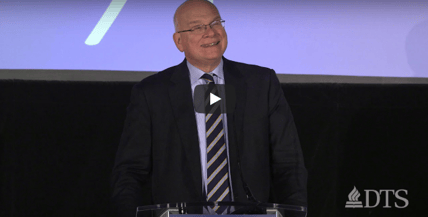
Tim Keller sees Old Paradigm Churches imported from Europe as fading from being relevant in America now, so that we are becoming spiritually dead like Europe. Younger people in droves, reacting to the hypocrisy of the older generation, have been dropping out of the Establishment. Keller noted that those who are living in the Old Paradigm believe in a "two storey" universe but Millennials live in a "one storey" universe. The upper storey is where God, the angels, and heaven are to be found. But the lower story is thought to be the domain of man and the church. A person seeking God should become part of the church community downstairs, and reach up to invite God to change him or her. Once converted, the supplicant only needs to conform to the lower story culture and supposedly live happily ever after. Whether or not Jesus actually is allowed to change the inner person, thought, emotions, motives is unimportant it is wrongly assumed, much of the time.
Actually, Intimacy with God is a very big deal.
Under the rules of the new paradigm there is only one storey to the universe, the upper storey is assumed by many to be empty. Therefore in the new paradigm, one hears, "I am God," "you are God" "we are all gods." This is all Eastern Pantheism. But Keller rightly said that a "two-storey" universe is more true to absolute reality. Anyone who knows the real Jesus and who has read the Bible knows the Upper Storey is vast and packed full of life. Those who are walking with resurrected Lord Jesus, earth's coming King, are safe, the rest are not.
At risk are Compromised Christians, Cultural Christians, Closeted Christians, Carnal Christians, Lapsed Christians, the Rebellious Ones, and of course Atheists, Agnostics and the like, as always. A small group of die-hard sinners, is excluded.
America was no AccidentThe change is only now becoming apparent to those who have worn blinders for decades. The “culture war” was lost a generation ago, because in the generation before that we Americans (by-and-large) settled for a comfortable and domesticated Gospel that panders to our own desires and promotes our own ends. 
"But Jeshurun grew fat and kicked; You grew fat, you grew thick, You are obese! Then he forsook God who made him, And scornfully esteemed the Rock of his salvation. |
What is happening now in history is that the real God is invading from upstairs. Jesus Christ is the unifying factor in breaking down the wall between all paradigms. Those who know Him are a protected species.
Younger people today often no longer follow the teachings of the church their forefathers belonged to. These churches are considered dead orthodoxy by many of them. The culture of America has been Christianized because of the influence of generations of true Christians embedded in an otherwise secular culture. But thinks have changed! There has never been a Christian nation in the world. The Bible speaks only of Israel and the Gentile powers. Only Israel has a covenant with God.
"Christians" attending most churches apparently adapt their behavior to what they see as prevailing standards. A vital daily walk with Jesus, obeying Him and not being conformed to the culture are rare. We think of our selves as responsible citizens calling on the impersonal God "who lives upstairs." The real New Testament imagery of our being Ambassadors to earth from another realm is illusive. When we die, we assume we’ll get to go to a remote heaven up there and be rewarded for our good deeds.
Many people who seem themselves as Old Paradigm “Christians” may not yet know Jesus personally. They are often trying to live good lives, but actually walking in the flesh, compromised by being still embedded in the evil world system. As noted, those living in the old paradigm tend to think of God and the angels as residing in the upper story of a two-story universe.
The disconnect has been profound. Loss of moral absolutes has followed: "I reject, insofar as possible, all superimposed moral values." There is also affinity for Eastern mysticism. Mind Altering drugs are common. A low view of marriage prevails. One find lots of Hooking Up for casual sex, MF, MM, FF, etc. Pragmatic decision-making prevails because of the loss of moral absolutes and a paucity of well grounded, trustworthy, visionary leaders.
“My parent’s values don’t apply to me. In many ways they were hypocritical and judgmental. I believe in tolerance for every one."
:Other religions are just as good as my parents’ Christianity.”
“I have never studied history seriously. I take one day at a time and I trust in Lady Luck.”
“My will is king. I do whatever seems right to me and I respect your right to do what seems right to you.”
“Bad things happen to good people and I am basically a good person. I have not read the Bible.”
“SELF is my god. Since I know that your god is also SELF, we must all respect the boundaries of everyone.”
"I reject a two storied universe (the old paradigm). If there is an upper story, it’s empty."
“My day to day life is existential. I must survive one day at a time. The future is totally unknown and unknowable.""If there is a heaven (which I doubt) I expect to go there when I die, because I’m basically a good person.”
“I am in a relationship with my GF or BF but we don’t plan to get married. Of course we have sex together but we also hook up with other people.Why get married at all? Everyone knows that sexual desires are part of life.
"Abstinence is impossible anyhow. "
"I accept other people who are wired differently than I am. They have a right to happiness just like me.”
“I am terrified of death and the hereafter.”
“I believe everyone deserves to be loved."
“I was raised in the church and my parents are very religious. But I am on a different quest in life.”
The point of all this is that most younger persons in America (under the age of about 40?) are now polytheists without knowing it.
"I am my own god but I acknowledge that you have your own god as well." "Since we have to get along with one another to survive, I choose to accept your right to your own god to not judge you." "There are no longer any absolutes in life."
The "gods" worshipped and served in the new paradigm are often undefined! The may be like the gods of the Hindu pantheism or nature gods, or they might be, for some, the gods of science. Prominent in our culture behind the scenes are the old Canaanite gods Baal, Asherah, Molech. (The whole subject falls under the category of Idolatry.)
Tim Keller points out that the Old Paradigm of a two-story universe is the correct view. At this time in history, the upper storey is at last breaking into the lower. The Bible has always presented the true truth, therefore professing followers of Jesus must live what we claim to believe. No wonder lots of people are stressed to the max lately!

Ho! Everyone who thirsts,
Come to the waters;
And you who have no money,
Come, buy and eat.
Yes, come, buy wine and milk
Without money and without price.
Why do you spend money for what is not bread,
And your wages for what does not satisfy?
Listen carefully to Me, and eat what is good,
And let your soul delight itself in abundance.
Incline your ear, and come to Me.
Hear, and your soul shall live;
And I will make an everlasting covenant with you—
The sure mercies of David.
Indeed I have given him as a witness to the people,
A leader and commander for the people.
Surely you shall call a nation you do not know,
And nations who do not know you shall run to you,
Because of the Lord your God,
And the Holy One of Israel;
For He has glorified you.”
Seek the Lord while He may be found,
Call upon Him while He is near.
Let the wicked forsake his way,
And the unrighteous man his thoughts;
Let him return to the Lord,
And He will have mercy on him;
And to our God,
For He will abundantly pardon.
“For My thoughts are not your thoughts,
Nor are your ways My ways,” says the Lord.
“For as the heavens are higher than the earth,
So are My ways higher than your ways,
And My thoughts than your thoughts.
“For as the rain comes down, and the snow from heaven,
And do not return there,
But water the earth,
And make it bring forth and bud,
That it may give seed to the sower
And bread to the eater,
So shall My word be that goes forth from My mouth;
It shall not return to Me void,
But it shall accomplish what I please,
And it shall prosper in the thing for which I sent it.
“For you shall go out with joy,
And be led out with peace;
The mountains and the hills
Shall break forth into singing before you,
And all the trees of the field shall clap their hands.
Instead of the thorn shall come up the cypress tree,
And instead of the brier shall come up the myrtle tree;
And it shall be to the Lord for a name,
For an everlasting sign that shall not be cut off.”
1 Praise the LORD!
Praise the name of the LORD;
Praise Him, O you servants of the LORD!
2 You who stand in the house of the LORD,
In the courts of the house of our God,
3 Praise the LORD, for the LORD is good;
Sing praises to His name, for it is pleasant.
4 For the LORD has chosen Jacob for Himself,
Israel for His special treasure.
5 For I know that the LORD is great,
And our Lord is above all gods.
6 Whatever the LORD pleases He does,
In heaven and in earth,
In the seas and in all deep places.
7 He causes the vapors to ascend from the ends of the earth;
He makes lightning for the rain;
He brings the wind out of His treasuries.
8 He destroyed the firstborn of Egypt,
Both of man and beast.
9 He sent signs and wonders into the midst of you, O Egypt,
Upon Pharaoh and all his servants.
10 He defeated many nations
And slew mighty kings--
11 Sihon king of the Amorites,
Og king of Bashan,
And all the kingdoms of Canaan--
12 And gave their land as a heritage,
A heritage to Israel His people.
13 Your name, O LORD, endures forever,
Your fame, O LORD, throughout all generations.
14 For the LORD will judge His people,
And He will have compassion on His servants.
15 The idols of the nations are silver and gold,
The work of men’s hands.
16 They have mouths, but they do not speak;
Eyes they have, but they do not see;
17 They have ears, but they do not hear;
Nor is there any breath in their mouths.
18 Those who make them are like them;
So is everyone who trusts in them.
19 Bless the LORD, O house of Israel!
Bless the LORD, O house of Aaron!
20 Bless the LORD, O house of Levi!
You who fear the LORD, bless the LORD!
21 Blessed be the LORD out of Zion,
Who dwells in Jerusalem!
Praise the LORD!
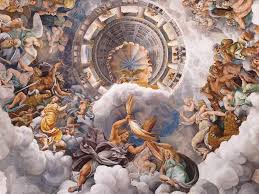
![]()

I am utterly amazed at today’s wide indifference to Jesus and our sense of entitlement. Is Jesus our errand boy, our genie in a bottle when we need our errands run?
In paying tribute to his cousin John the Baptist, our Lord called attention to the reality that we ignore God most of the time, no matter the life style of His messenger. But John and Jesus were very different reps of the one true God. Though men are not real gods and can not become "God" the Apostle Peter says something amazing in this regard. Peter writes,
"God's divine power has granted to us all things that pertain to life and godliness, through the knowledge of him who called us to his own glory and excellence, by which he has granted to us his precious and very great promises, that through these you may escape from the corruption that is in the world because of passion, and become partakers of the divine nature." (2 Peter 1:3-4)
The New Testament shows in clear terms that normal humanity was designed to be indwelt by God. We human are incomplete without a relationship with a personal God. This is how God decided to create us! Granting men free will and allowing to know their Creator by means of personal relationships (one at a time) now opens marvelous possibilities for life and liberty among men. "You are complete in Christ who is the head of all rule and authority," Paul writes in Colossians.
God uses mostly masculine pronouns when speaking to us in Biblical revelation. But believers understand right away that the Biblical God is not a sexual bring--as the heathen gods usually are. The image of God in man can not be expressed by a male alone, but must be imaged to us by male and female together.
"Then God [Elohim] said, "Let us make man in our image, after our likeness; and let them have dominion over the fish of the sea, and over the birds of the air, and over the cattle, and over all the earth, and over every creeping thing that creeps upon the earth." So God created man in his own image, in the image of God he created him; male and female he created them. And God blessed them, and God said to them, "Be fruitful and multiply, and fill the earth and subdue it; and have dominion over the fish of the sea and over the birds of the air and over every living thing that moves upon the earth." (Genesis 1:26-28)
That is, the God of the Bible is as much "feminine" as He is "masculine"-- we must use these terms carefully when talking about the nature of God. God is not a sexual Being. He is Three Persons, not two. Men and women are identical in spirit but different in soul and in body. The interactions of the two sexes are not the interactions of two identical clones with one another, but relationships of unique persons who are designed to balance and complement one another. (See Made in the Image of God). Furthermore, no two human beings are identical. Each one of us is a unique creation--a work of exquisite art. Therefore the personal relationship each of us has with God is one-of-a-kind. Every friendship, every marriage, every relationship we have with another person, is also unique. God likes variety in His all creative handiwork--He did not make us a bunch of clones and we are far, far from being puppets, zombies, or robots.
When we think of interpersonal relationships of any kind it is immediately evident that we are all constantly involved in both initiating and responding, giving and receiving. One can not have the one without the other. There also exists in life a response to match a stimulus, a responder to answer to the initiator. God Himself is also a "community of three persons." Therefore the true God is also the God of community. The importance of community is very important. God Himself is a member of the community. This is also part of His design for mankind. God participates fully in all aspects of His creation.
If God being a member of the community was not a very evident fact of life before the birth of Jesus, it is certainly clear from the New Testament that in taking on the form of a man, the Son of God, the second Person of the Trinity, has indeed joined Himself to our humanity. God's purpose in doing this is not only to accomplish our salvation from sin but to enable us to live together in community with Him forever more. God meets us through the man Jesus Christ as our Mediator, our Great High Priest, our Counselor, our Lover, our Friend. For instance, there are two Adams in the Bible: the first Adam, from whom we have all descended--and Jesus the Last Adam who heads a whole new race of humans. Christians can think of Jesus as their Elder Brother--among His many other attributes.
"Have this mind among yourselves, which is yours in Christ Jesus, who, though he was in the form of God, did not count equality with God a thing to be grasped, but emptied himself, taking the form of a servant, being born in the likeness of men. And being found in human form he humbled himself and became obedient unto death, even death on a cross. Therefore God has highly exalted him and bestowed on him the name which is above every name, that at the name of Jesus every knee should bow, in heaven and on earth and under the earth, and every tongue confess that Jesus Christ is Lord, to the glory of God the Father." (Philippians 2:5-11)
About this "family" the Bible has much to say! Once one begins to speak of a personal God who wants to know people personally and once we learn that this God has chosen to meet us through a fellow human being of our own race, Christian faith moves quickly and radically apart from all other religions. [Because of the Fall--man's rebellion against God--one becomes a true member of God's family by spiritual rebirth--but this does not release non-Christians from ultimate accountability to God as Creator, Lord and Judge of all.]
Jesus calls us to rest: to cease trying harder and to rest in the sufficiency of an indwelling Lord. He alone has real life and offers it abundantly if only we give Him permission.
“When Jesus Christ comes into your life, he doesn't come to destroy your personality. He does destroy your ego, and it's good for it to go-that independent self that seeks always to be the center of the stage. He will wage relentless, unending war against that, and the weapon he uses is the cross, those hardships and trials and humiliating experiences which he brings you through that brings that ego to an end. It puts it where God put it-on the cross, in the place of death. He does not destroy the essential man; he indwells it, he enhances it, he glorifies it. The result is true manhood, true womanhood,attractive and beautiful and easy to live with. Man as God intended man to be becomes manifest in the world. That is incarnation!“ (Ray Stedman)
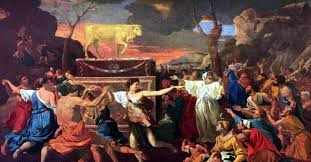
And God spoke all these words, saying: 2 “I am the LORD your God, who brought you out of the land of Egypt, out of the house of bondage. 3 “You shall have no other gods before Me. 4 “You shall not make for yourself a carved image--any likeness of anything that is in heaven above, or that is in the earth beneath, or that is in the water under the earth; 5 you shall not bow down to them nor serve them. For I, the LORD your God, am a jealous God, visiting the iniquity of the fathers upon the children to the third and fourth generations of those who hate Me, 6 but showing mercy to thousands, to those who love Me and keep My commandments. 7 “You shall not take the name of the LORD your God in vain, for the LORD will not hold him guiltless who takes His name in vain. 8 “Remember the Sabbath day, to keep it holy. 9 Six days you shall labor and do all your work, 10 but the seventh day is the Sabbath of the LORD your God. In it you shall do no work: you, nor your son, nor your daughter, nor your male servant, nor your female servant, nor your cattle, nor your stranger who is within your gates. 11 For in six days the LORD made the heavens and the earth, the sea, and all that is in them, and rested the seventh day. Therefore the LORD blessed the Sabbath day and hallowed it. 12 “Honor your father and your mother, that your days may be long upon the land which the Lord your God is giving you. 13 “You shall not murder. 14 “You shall not commit adultery. 15 “You shall not steal. 16 “You shall not bear false witness against your neighbor. 17 “You shall not covet your neighbor’s house; you shall not covet your neighbor’s wife, nor his male servant, nor his female servant, nor his ox, nor his donkey, nor anything that is your neighbor’s.” 18 Now all the people witnessed the thunderings, the lightning flashes, the sound of the trumpet, and the mountain smoking; and when the people saw it, they trembled and stood afar off. 19 Then they said to Moses, “You speak with us, and we will hear; but let not God speak with us, lest we die.” 20 And Moses said to the people, “Do not fear; for God has come to test you, and that His fear may be before you, so that you may not sin.” 21 So the people stood afar off, but Moses drew near the thick darkness where God was. 22 Then the LORD said to Moses, “Thus you shall say to the children of Israel: ‘You have seen that I have talked with you from heaven. 23 ‘You shall not make anything to be with Me--gods of silver or gods of gold you shall not make for yourselves.” (Exodus 30:1-30)

1 Oh, sing to the LORD a new song! Sing to the LORD, all the earth.
2 Sing to the LORD, bless His name;
Proclaim the good news of His salvation from day to day.
3 Declare His glory among the nations, His wonders among all peoples.
4 For the LORD is great and greatly to be praised; He is to be feared above all gods.
5 For all the gods of the peoples are idols, But the LORD made the heavens.
6 Honor and majesty are before Him; Strength and beauty are in His sanctuary.
7 Give to the LORD, O families of the peoples, Give to the LORD glory and strength.
8 Give to the LORD the glory due His name; Bring an offering, and come into His courts.
9 Oh, worship the LORD in the beauty of holiness! Tremble before Him, all the earth.
10 Say among the nations,
“The LORD reigns; The world also is firmly established, It shall not be moved;
He shall judge the peoples righteously.”
11 Let the heavens rejoice, and let the earth be glad;
Let the sea roar, and all its fullness;
12 Let the field be joyful, and all that is in it.
Then all the trees of the woods will rejoice before the LORD.
13 For He is coming, for He is coming to judge the earth.
He shall judge the world with righteousness, And the peoples with His truth.
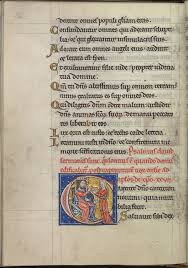
Ray Stedman had astute insights into idolatry today. very relevant today. For example, his message Athens and Paul is very relevant today.
At the time of Paul's visit to Athens, that city was no longer important as a political seat; Corinth was the commercial and political center of Greece under the Roman Caesars. But Athens was still the university center of the world. It was the heir of the great philosophers, the city of Pericles and Demosthenes, of Socrates, Plato, Aristotle, Sophocles, and Euripides -- these men who established patterns of thought that have affected human learning for centuries. Almost all philosophies follow, in some degree, the teachings of these men. But Athens was long past its zenith when Paul visited it. It was now four hundred years after the golden age of Greece, and, though Athens was still a center of art, beauty, culture, and knowledge, the city had lost all political importance.
Remember that Paul came down from Berea with certain unnamed Christians and was left alone in Athens. He sent word back to Silas and Timothy, whom he had left in Berea, to join him there. Evidently the apostle did not intend to stay long in Athens. He was heading for Corinth, the political capital, for Paul always focused upon those areas where the commerce of life flowed and where the influence of a church would rapidly reach out into the surrounding regions. He had decided to wait for Silas and Timothy in Athens, and Luke now tells us what happened there, as doubtless it was later told to him by Paul himself:
Now while Paul was waiting for them at Athens, his spirit was provoked within him as he saw that the city was full of idols. So he argued in the synagogue with the Jews and the devout persons, and in the market place every day with those who chanced to be there. Some also of the Epicurean and Stoic philosophers met him. (Acts 17:16-18a RSV)
This section is a powerful revelation of why the gospel needs to be presented to every culture and every age of the world. While Paul was waiting at Athens, he did what any tourist does in Athens: He went sightseeing. If you have been in Athens, you know what a striking city this is. There are the great temples of the Acropolis, crowned by the Parthenon -- now in a ruined state but nevertheless still one of the most beautiful buildings in all the world. There are many other theaters, temples, and marketplaces of ancient Athens which can still be seen.
As the apostle walked around the city he saw the gods of Athens, the idols that were being worshiped. One of the ancient writers tells us that at this time there were 30,000 gods in Athens! Many of these statues have survived and you will find copies of them everywhere as samples of ancient art. Paul recognized that these were not merely objects of art, but were actually gods being worshiped by the people of Athens. Peterronius, one of the ancient historians, said that is was easier to find a god in Athens than a man! With 30,000 of them, you can see why this would be true.
Luke tells us that Paul's spirit was moved when he saw this. He was provoked. The Greek word is the word from which we get out word paroxysm. Paul felt an intense paroxysm of the spirit, a storm within, as he saw the city given over to idolatry. Each idol revealed that these men and women of Athens had a great capacity for God. They knew there was something beyond man, and they were seeking for it. But each idol also revealed a twisting, a distorting, of that capacity, a sabotaging of it. So, as the apostle went around the city, his spirit was greatly troubled to see men and women blasted by this prostitution of their human powers through the worship of false gods.
What Paul felt was very much akin to what must have moved a group of Christian students recently when they ran an ad in the Stanford Daily. I have quoted parts of this before, but I would like to read one paragraph again because it seems to me to capture the exact sense of what gripped the apostle's heart in Athens:
Why are we Christians willing to follow Jesus into suffering in order to accomplish his mission of liberation? Because Jesus has changed our minds about a lot of things, and we can no longer tolerate the foolishness and futility that is passed out as wisdom at this university. We are tired of the "enlightenment" of this age which is blindly ignorant of its intellectual slavery to materialism and its contradictory obligation to ethical relativism. We are tired of seeing people's lives wasted and unfulfilled because of their submission to the established world order.
That expresses exactly what the apostle felt as he moved about the city, and saw the cloud of idolatry that hung over this city, blotting out the truth and light, and plunging these people into the darkness of superstition. So he began to preach. He could not help it. He knew that the only message that could help people in this state was the delivering word of Jesus. There were three groups to whom he spoke:
First he went into the synagogue, as his custom was, and there spoke to the religious people, the Jews and devout persons who were there. These Jews (and the Greeks who were following Judaism) were opposed to the idolatry of the city, but could do nothing to prevent it. There was nothing they said that could help the city. They themselves were delivered from idolatry, but they were powerless to deliver the city because they were focusing on their own religious experience. To these religious persons, Paul preached the gospel with seemingly little effect.
Then there were the common citizens of the city whom he met in the marketplace, the agora of ancient Greece -- tradesmen, people going about their business, commercial people coming in with their wares to the city square. There he met them and talked with them. Here were people who were unthinking victims of the idolatry that held the city in its grip. They were sunken in superstition, gripped by fear, uncertainty, dread of darkness, and inner tensions and turmoil. These are always the results of following false gods.
Then there was a third group, the philosophers. These were men who were delivered themselves from the crass idolatry of the city, but who were offering, as an alternative, the barren concepts of pagan philosophy. There are two kinds mentioned here, the Epicureans and the Stoics. Now, do not think that we have left Epicureanism and Stoicism behind, for we have not; they are very much in evidence today.
The Epicureans were atheists; they denied God's existence. They denied a life after death. They were also materialists, and felt that this life was the only thing that really existed and that, therefore, men should get the most out of it. They felt that pleasure was the highest virtue, and that pain was the opposite. Their motto (and it still persists to this day) was "Eat, drink, and be merry, for tomorrow we die." They were what we would call today "existentialists," living for the experience of the moment. This is a widespread philosophy in our day, although it is no longer called Epicureanism.
The Stoics, followers of the philosopher Zeno, were pantheists. That is, they believed that everything is God, and that he does not exist as a separate entity, but is in the rocks and trees and every material thing. Their attitude toward life was one of ultimate resignation, and they prided themselves on their ability to take whatever came. Their motto, in modern terms, was "Grin and bear it." They urged moderation: "Don't get over-emotional, either about tragedy or happiness." Apathy was regarded as the highest virtue of life. You will recognize there are many people today who feel that the best thing they can do is to take whatever comes and handle it the best they can. These Stoics were all proud fatalists, and there are many like them today. Luke gives us the initial reaction of these two philosophical groups to Paul:
And some said, "What would this babbler say?" [Those were the Epicureans.] Others said, "He seems to be a preacher of foreign divinities" -- because he preached Jesus and the resurrection. [These were the Stoics.] And they took hold of him and brought him to the Areopagus, saying, "May we know what this new teaching is which you present? For you bring some strange things to our ears; we wish to know therefore what these things mean." Now all the Athenians and the foreigners who lived there spent their time in nothing except telling or hearing something new. (Acts 17:18b-21 RSV).
This is a very revealing reaction. The Epicureans, who were basically atheistic materialists, were contemptuous of what they heard from Paul. They treated him with utter disdain. They said, "What would this babbler say?" The word babbler is literally "seed-pecker." They saw Paul as one of the little birds in the marketplace going around pecking at seeds here and there. They regarded him as a mere collector of fragments of truth, gathering a few choice words from philosophies that he had picked up along the way and trying to impress people. They smiled and dismissed him contemptuously.
But the Stoics were interested. Yet Luke is careful to tell us that their interest did not arise out of a genuine desire to know and understand what Paul said, but out of a shallow curiosity that was intrigued by the fact that he seemed to present two new gods -- one named Jesus and the other named Resurrection.
This was not an unusual concept for Athens; throughout the city you could find altars erected to various themes. There were altars to Shame, altars to Reason, to Virtue, and to various themes. When they heard Paul speak of resurrection, they thought this was the name of a god, and that he was preaching two new deities. They pricked up their ears because, as Luke said, "All they lived for was to hear something new." That is modern too, is it not?
Here in ancient Athens were all the classes of humanity that are still with us today. There were the religious oddballs, remote from life and powerless to affect it; there were the thoughtless idolaters, sunken in superstition, living lives of quiet desperation, as do millions of people today; there were the atheistic existentialists who were priding themselves upon the rejection of all supernatural things and were focusing upon the present existence; and there were the self-sufficient fatalists who took pride in their ability to handle whatever comes and not show too much emotion in doing so. To all these the apostle presented one thing: The delivering word of Jesus, the word of the power of God unto salvation. In due course they brought him before the Areopagus.
If you visit Athens today you will be taken up a small rocky hill without buildings, west of the Acropolis, and told that this is the Mars Hill where Paul addressed the Athenian philosophers. I question that this is so, although the word Areopagus does mean Mars Hill. But it was also the name given to a court of judges who had the final authority in the city of Athens at this time. It is much more likely that it was this court before whom Paul was brought. They no longer met on Mars Hill, although they had originally. By this time they were meeting in the marketplace in one of the porches surrounding the area. So it is before the court of the Areopagus that Paul appears. In the message he gave to them, we have a splendid example of just how the gospel operates to deliver men. It is a fantastic message and I urge you to give careful attention as we look at it more closely now. There are three parts to it, beginning with a most captivating introduction:
So Paul, standing in the middle of the Areopagus, said: "Men of Athens, I perceive that in every way you are very religious. For as I passed along, and observed the objects of your worship, I found also an altar with this inscription, 'To an unknown god.' What therefore you worship as unknown, this I proclaim to you." (Acts 17:22-23)
This is a most thoughtful introduction. A good introduction always begins where people are, and this is what Paul did. He began right where these Athenians were. He did not denounce them, he did not attack their idolatry; in fact, he paid them a compliment as far as he could. He said to them "Men of Athens, as I've been walking about your city, I've noticed one thing about you: You are a very religious people." The word he used was literally, "you are god-fearers." But the word he chose for "god" was rather unusual. Instead of the common word theos, which means God in his greatness, he chose the word daimon, demon, by which he implied that the gods they worshiped were lesser concepts than the great idea of God. They understood that he meant to compliment them because they had a concept of, and a capacity for, God. They were very much involved with and interested in God.
Then he said, "As I've been walking about, I found an altar to an unknown god." There were several of these in Athens. Many centuries before, a plague had been arrested by turning loose a flock of sheep within the city. Wherever the sheep were found they were slain and offered to a god. If they were slain near the altar of a recognized god they were dedicated to it; but if they were slain apart from any of these, an altar was erected and dedicated to an unknown god! Paul found one of these, and said, "This is the God I want to talk about. What you worship ignorantly I have come to declare to you." It was a great introduction. It reveals the emptiness of paganism. If you do not worship the true God, there is no end to your search; you will keep going forever. There were 30,000 gods in Athens, but they had not had enough yet; they had also erected altars to an unknown god! How clearly this voices the agony of humanity, the cry for a God they know exists, but cannot find.
Just last week, David Roper was telling the staff of a young man who came up to him at a rally at Stanford. This young man, obviously upset, his eyes wild, rushed up to him, and seizing him by the shoulders and shaking him, said, "Can you tell me where I can find Dave Roper?" Dave said he felt almost like denying he knew him, but gulped, and admitted that he was Dave Roper. The young man immediately said, "Can you tell me how I can find God?" That was the hunger of his heart. This is what Paul sensed at Athens, the hunger for the God they cannot find. In the rest of the message, he gives just two things: He unfolds the truth about the living God which idolatry denied, and then he shows them the corresponding truth about man which followed as a logical result of the truth about God:
"The God who made the world and everything in it, being Lord of heaven and earth, does not live in shrines made by man, nor is he served by human hands, as though he needed anything, since he himself gives to all men life and breath and everything." (Acts 17:24-25 RSV)
What is he saying here? First, that God is the Maker and not the one who was made. God was not created by man; he is the One who makes man and everything else that exists in all the universe. He is the originator of all things.
We have not moved very far from ancient idolatry. In the ancient world, they took a piece of gold or silver or wood and carved or formed an idol, thus worshiping the works of men's hands. Today we don't use images, but we still see men worshiping themselves, projected to infinite proportions. Man simply thinks of himself, projects this into infinity, and worships that. That is his god. That is exactly what idolatry did. Paul points out that this is not in line with reality. God is not the projection of man; God is greater than man. God originated man. Everything that exists came from his hands. He is the Maker, and not the made.
Second, God is the giver, and does not have any needs himself. "The God who made the world and everything in it is not served by human hands as though he needed anything, since he himself gives to all men life and breath and everything." God is not looking for anything from man, as idolatry and paganism taught. Men had to bring gifts to the gods, they had to do things for their gods, to propitiate them and sacrifice to them, and bring them all kinds of things.
Men today are still doing the same. The gods of men today still make demands upon them. Do not think that we are free from idolatry, for if a god is that which is the most important thing in your life, that to which you give your time and effort and energy, that which occupies the primary place of importance to you, the thing you live for, then men have many gods even today. Money is a god for some. Fame is a god to others. Your children can be your gods. You yourself can be your own god; you can worship yourself. I am appalled at the number of people today who worship America and enthrone it as the highest value in life, the thing for which they would give their lives, the only thing worth living for. These are the false gods that people everywhere worship. They make continual demands upon us. They do nothing for us, but we must work for them.
Paul cancels all this out. He says the real God is one who gives, who pours out. He does not need anything from you. He does not live in temples made by man. I am sure he must have pointed to the Parthenon as he said that, for it was regarded as the home of Athene, the goddess for whom the city was named. God does not live in places like that, he said, but he is the one who made you and everything about you, and there is nothing you can give him that he needs. He is, rather, giving himself continually to you.
The third great truth was to show how God draws men and does not seek to evade them. To the pagans the gods dwelt on Mount Olympus, remote from humanity. Men had to go through perilous and hazardous journeys in order to find and placate their gods, to seek them out and find them, while the gods hid themselves from men. But Paul's word is that the true God is not doing that:
"And he made from one every nation of men to live on all the face of the earth, having determined allotted periods and the boundaries of their habitation, that they should seek God, in the hope that they might feel after him and find him." (Acts 17:26-27a RSV)
The true God is the God of history. He made man as one race, originating from one source. The interesting thing is that today this statement is as scientifically sound as when it was first uttered. Science today admits that there is only one race of men, one species: Homo sapiens. Despite the differences of pigment, stature, and feature that exist around the world, there is only one race of men. They all come from one source. Furthermore, he has intervened to direct their lives through the course of history. He has determined where they shall live, and how long they will live there, how long a nation or empire should take to rise and then fall again; doing so not arbitrarily, but based upon their reaction to the one great reason for which human beings exist: That they might find God, "that they might feel after him and find him." That is why God has allowed history.
The events of human history have all been to this end -- that they might find God, that man might be motivated to search for him. Remember, Hebrews 11:6 says, "For whoever would draw near to God must believe that he exists and that he rewards those who seek him..." (Hebrews 11:6 RSV). In Jeremiah 29:13 we read, "Thus says the Lord: ... when you seek me with all your heart, I will be found by you" (Jeremiah 29:10a, 29:13b-14a RSV). God is urging men to seek him. That is why catastrophes occur. That is why wars break out. That is why violence occurs. God allows the evil in men's hearts to break out in these terrible catastrophes, these tremendously difficult events, in order to show men that they are not independent; that is a self-delusion to fancy they can live without God for in him they live and move and have their being, as the apostle will say a little later. It is ridiculous, absurd, nothing but a self-delusive, deceitful trick, and dishonest in the extreme, to think that anyone can operate, as a man or a woman, without God. Their very life and breath is coming from him.
There are many people here this morning who could stand up and testify, if we gave you opportunity, that you lived for years in the grip of this idolatrous delusion that you were sufficient in yourself until something occurred that put you flat on your back, or broke your heart, or came crashing in as some great disappointment, and made you realize for the first time that you could not live without God. That is why history exists, that God may reveal himself as the God who draws men, who awakens them, who urges them to find him, to seek him, and who will reward those who diligently seek him. Now, in the next section, the apostle concludes with a wonderful statement about man. Here we learn some new things:
"Yet he is not far from each one of us, for
'In him we live and move and have our being';
as even some of your poets have said,
'For we are indeed his offspring.'
Being then God's offspring, we ought not to think that the Deity is like gold, or silver, or stone, a representation by the art and imagination of man. The times of ignorance God overlooked, but now he commands all men everywhere to repent, because he has fixed a day on which he will judge the world in righteousness by a man whom he has appointed, and of this he has given assurance to all men by raising him from the dead." (Acts 17:27b-31 RSV)What a fantastic statement! It begins with the fact of the dignity of man, recognizing that man is God's offspring. It is not Biblical to go around telling people that man is nothing, that he is vile, that he is a worm, etc. This is not the Biblical view of man as he was created.
I sometimes hear Christians talking as though they were nothing and God is everything. Now, I understand what they mean, but the truth is: Man is not a mere nothing. He can do nothing, but the Bible never says that he is nothing. What the Bible says is that man is the image of God, and that he has a capacity to respond to God. He is made for God. Everywhere you go, even among the most degraded and primitive of men, you will find this pattern of the image of God. For one thing, you will never find a man, woman, boy, or girl who does not have a passion for life, who does not want to live, who is not in revolt against death and boredom and frustration and all the other negative qualities of life. They all want to seize hold of life. And you will never find a man, woman, boy or girl who does not have a passion for dominion, who does not want to succeed, who does not want to reach out and try something new and accomplish new objectives, to conquer new territory. That is because man is made in the image of God. Further, you will never find a human being who does not have some power to create, to invent, some ability to produce or fashion or make or shape. This is inherent in the heart of man everywhere; no animal ever does that. Also men seek to communicate, animals do not. These are all part of the image of God which is widespread everywhere. That image is man's greatest dignity.
But right along with this the apostle mentions the tragedy of man. "Being God's offspring [which even your pagan poets recognize is true], we ought not to think that the Deity is like gold, or silver, or stone, a representation by the art and imagination of man." He is saying that, if it is true that we are made with a capacity for God, if we know that we are made to contain and reflect God, then it is not only insulting to God to make an idol of him, but it is also degrading to man. It is saying that we can be satisfied with things that are less than ourselves, that we can find satisfaction in trinkets and trifles and baubles, in material values. Wherever people act on that basis, you will always find them returning to childish actions, becoming childlike. Idolatry of any kind does this to man, degrades him, makes a man act like an infant. In Edwin Markham's great poem, The Man with the Hoe, as he is thinking of man in his low estate, he asks the question,
Is this the thing the Lord God made, and gave
To have dominion over sea and land,
To trace the stars, and search the heavens for power
And feel the passion of eternity?Even in that degraded estate, there is a recognizable a capacity for God. The tragedy is that this capacity is being prostituted into something less than the God for which it was designed. That is what moved Paul so strongly.
The last thing Paul points out is man's responsibility. Men have lived, he says, in "times of ignorance." Now, these "times of ignorance" need to be understood carefully. This phrase does not refer to a certain date on the calendar. It is not speaking of Old Testament times, as such, or of past dispensations, before the present era. These "times of ignorance" are related only to the individual. That is, they refer to the times in your life, or my life, when we, as the offspring of God, creatures made by God and designed for God, were trying to satisfy ourselves with things that were less than God. This is always a time of ignorance, a time when a man is operating on a level that reveals his utter ignorance of reality. Paul declares that God overlooks these times. He does not wipe us out. He does not judge us, he does not hate us and reject us, but patiently waits while we live through these struggling times.
But the apostle further declares that when a man hears about Jesus, when he hears the good news that Jesus Christ is the way to the heart of God, then he is put in a most responsible position. When he learns the truth about Jesus, he then has a responsibility before God to change his mind, to go on no longer acting as he did before. That is what repentance means -- a change of mind. You are responsible to change your mind and lay hold of that which God has provided in Jesus Christ. Paul gives us here three great facts which underscore the importance of repentance:
First, there is an inescapable day coming. God has fixed a day when he will judge the world. Everyone knows this. You know it, don't you? You know there is a day coming when your life is going to be laid open before everyone, and all the value of it, or the lack of value, will be evident. There is coming a day when every life will be evaluated. Second, there is an unchallengeable Judge. The One who will do the evaluating will not be a god, remote upon Mount Olympus, but he will be a Man, someone who has lived right here with us, who knows what human life is like, who has felt everything we feel. He will be the One who passes judgment on that day. Third, God has made this evident to all by an irrefutable fact: He raised that Man from the dead. There is where Christianity ultimately rests. If you can disprove the resurrection of Jesus, you can destroy Christianity in one blow. But as long as that fact remains unshaken, undestroyed, Christianity is indestructible. It rests upon that one great demonstrable fact -- that God raised Jesus from the dead. That is the guarantee that all God says will happen. Now you can see what a fantastic effect this message must have had. Luke gives us, in these closing words, the reaction of Athens:
Now when they heard of the resurrection of the dead, some mocked; but others said, "We will hear you again about this." So Paul went out from among them. But some men joined him and believed, among them Dionysius the Areopagite and a woman named Damaris and others with them. (Acts 17:32-34 RSV)
Some mocked. That means their pride was threatened. Mocking is always the defense of pride when it feels itself attacked but has no logical defense; it resorts to ridicule. This is still the reaction of many today. Whenever they hear of Jesus, they begin to ridicule. But Christianity ridiculed is always a sign of weakness, an admission of defeat. Second, some delayed. They succumbed to the curse of the intellectual -- academic detachment. They viewed themselves as outside the system they were examining and thus detached from it. "Everyone else is subject to this but us." So they said, "We will listen to you again on this; we need more evidence." These are the delaying tactics which many intellectuals are using today. But some believed. That is the great word here. Some repented, changed their minds. This indicates that among these intellectuals there are earnest, honest people who were trying to find the answers to life. When they hear the good news about Jesus, and understand what this fantastic gospel message really is, how it delivers men from their superstitious fears, how it breaks through the darkness of men's minds and opens them up to the God of glory, the God of the universe, and to a resurrected Lord who, risen from the dead, seizes the scepter of universal empire, their hearts respond, and they believe.
Here is one such, Dionysius the Areopagite. He was one of the judges, an intellectual, a ruler of the city, but he became a Christian. With him was a woman named Damaris. I am glad that Luke included the name, here, of a woman, for this indicated again that these Greek women were searching for answers in the midst of the pagan darkness in which they lived. There were others among them. We do not know how many, perhaps just a few. Athens was much more resistant than any other city would be (a university city always is), but there were some who believed.
Here then is a church planted in Athens. We never hear anything about it again, although I suspect that the letters to the Corinthians were also shared with the church in Athens, because the cities were not very far apart. Paul addresses the Corinthian letters to "all those who in every place call on the name of our Lord Jesus..." (1 Corinthians 1:2b RSV). We do not know what happened to the church at Athens except that here, in the midst of this darkness, the light of Jesus Christ began to shine, and a body was formed. From that body, power began to penetrate into the secluded areas of darkness where evil sat entrenched within this great intellectual capital of the world, and to shake men loose, and to set them free from the chains of darkness. May God grant that this may be true in our day, where there is evident so much of the same idolatry that enslaved the people of Athens.
The Exchanged Life | The Left Behind | Eternally Lost | Intimacy with God | Dual Membership in the Family of God| The Rapture and the Second Coming
The Judgment Seat of Christ | Baptism | The Great Shepherd | How Saved are You? | Made in the Image of God | The Ruin of Creation


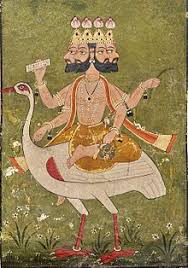

 -----
----- 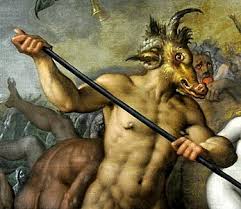
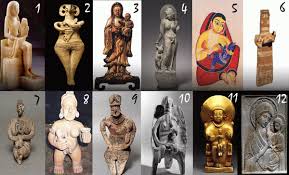
B.C.The Prophets
|
A.D.GodJesus The Church Israel The Nations |

The Ego Papers Series |
Yin, Yang, the Tao and Wholeness
![]()
According to the Bible, we (men and women) are tripartite being made in the image of God. We are spirit, soul, and spirit. (Men and women are identical in spirit but different in soul and body. (See Made in the Image of God).
This series of articles on the ego is about the spirit mostly. The vast science of Psychology is about the soul. Personality types, behavior patterns, relationships are about the soul rather the spirit. There is lots of overlap! Soul and spirit usually are closely connection, distinguishable only with God’s help.
Articles 1-4 in this series are mainly about the ego as assertive, domineering, controlling. This article is about the ego turned inward--impacted like a tooth--which can result in recalcitrance, stubbornness, resistance to positive change. Usually we think of movers-and-shakers, pioneers, outspoken radicals, revolutionists as the only valid instruments of change. This is patently false. God is in the fine print and the details. Consider how inexorable springtime is after a long dark, bleak, cold winter. God is love, remember.
"I am the resurrection and the life; he who believes in me, though he die, yet shall he live, and whoever lives and believes in me shall never die. Do you believe this?" (John 11:25-26 RSV)
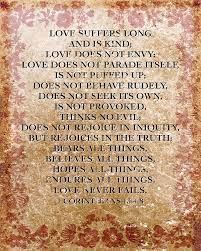
 “For the word of God is living and powerful, and sharper than any two-edged sword, piercing even to the division of soul and spirit, and of joints and marrow, and is a discerner of the thoughts and intents of the heart.“ (Hebrews 4:12)
“For the word of God is living and powerful, and sharper than any two-edged sword, piercing even to the division of soul and spirit, and of joints and marrow, and is a discerner of the thoughts and intents of the heart.“ (Hebrews 4:12)
If you are living in a cemetery, if everything is dead and dull and lifeless around you, try resurrection power. That is what it is for. It means that this power takes no notice at all of obstacles, just as Jesus rose from the dead, paying no attention to the stone, to the decrees of Caesar, to the fulminations of the Jewish priests, nor to the guard in front of the tomb. Resurrection power doesn't pay any attention to obstacles. It just surges on ahead, leaves the problems up to God, and goes on. It means that resurrection power requires no outside support. It doesn't rely upon someone else, nor upon something else. It doesn't need a vote of confidence. It doesn't require any kind of undergirding expressions of support from anybody. It can operate alone, completely alone, if necessary. And it means that it makes no noise or display. It doesn't try to arrest attention by some publicity stunt. It just works quietly and, without any noise, effects its transformation, brings life out of death. And further, you will notice that the apostle declares that it is supreme in the universe:...far above all rule and authority and power and dominion, and above every name that is named, not only in this age but also in that which is to come. (Ephesians 1:21 RSV) (RCS)
Introversion/Extroversion and personality types, temperament, are generally matters of the soul more than the spirit. The overlap is evident when matters of the spirit are discussed.
The key words:Touchy, Manipulative, Controlling, Smothering, Deceitful, Seductive, Recalcitrant, Stubborn, Entrenched, Falsely Humble, Opinionated, Devious, Deceitful, Sinister,
Manipulative...are usually thought of as spiritual rather than soul topics.

 Usually we are well aware of pompous, arrogant. In-your-face people with inflated egos.
Usually we are well aware of pompous, arrogant. In-your-face people with inflated egos. 
But not everyone is like that! What about shy persons*, the humble, the modest, the introverted?
(* as championed for example by Garrison Keillor from 1974 to 2016).
Psychology has made much ado about all this for good reason.
If the ego is the same entity as the “spirit” the doors for much discussion are wide open.
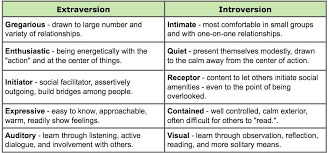
![]()

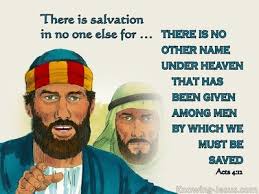 There is a cosmic Fall Guy available for any and all of us who admit we need one! That Man is Jesus.
There is a cosmic Fall Guy available for any and all of us who admit we need one! That Man is Jesus.
“Nor is there salvation in any other, for there is no other name under heaven given among men by which we must be saved.”(Acts 4:12)
In daily life many of us blameshift without giving it a second thought. Psychologists call this coping mechanism "projection." It's a built-in system put there by God to keep us from being constantly self-deceived or deluded into thinking I'm not. Default mode for most of us is "i am god..."
Never mind the real God is "I AM WHO I AM." Also, God is holy!
"For if anyone thinks himself to be something, when he is nothing, he deceives himself." (Galatians 6:3)
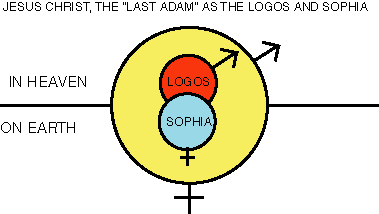
Spiritually Dead?Note: many people are described as “spiritually dead” in the Bible. The term refers to knowing God or not knowing Him: “God is Spirit, and those who worship Him must worship in spirit and truth.” (John 4:24) |
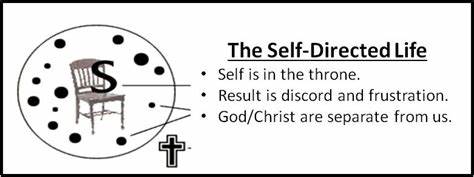
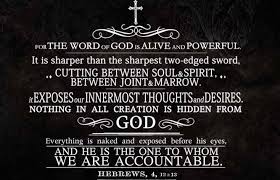
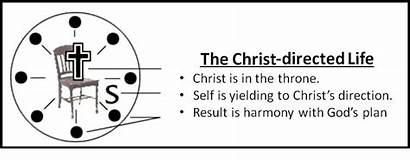

![]()

Lambert's Place
Email Lambert Dolphin
Archive for Newsletters
Library Annex (since 2018)
May 20, 2021

 Moses lived 120 years. His life can be divided into three forty year segments. Part one took place in the court of Pharaoh. Part two was his exile in Midian. When he was 80 years old, God called Moses to lead the people of Israel out of Egypt to the promised land. While in Midian, Moses came upon a strange burning bush. God spoke to Moses out of that bush, declaring that He had heard the prayers of the children of Israel and it was time for their deliverance from Egypt. Moses was chosen as their leader. When Moses inquired further about God, the voice from the bush replied, I AM WHO I AM.
Moses lived 120 years. His life can be divided into three forty year segments. Part one took place in the court of Pharaoh. Part two was his exile in Midian. When he was 80 years old, God called Moses to lead the people of Israel out of Egypt to the promised land. While in Midian, Moses came upon a strange burning bush. God spoke to Moses out of that bush, declaring that He had heard the prayers of the children of Israel and it was time for their deliverance from Egypt. Moses was chosen as their leader. When Moses inquired further about God, the voice from the bush replied, I AM WHO I AM.
The Hebrew covenant name is usually Yahweh to us, from the Hebrew YHWH, also known as the Tetragrammaton. (Translated Jehovah and “the LORD" in our English Bibles--all caps). God is living and holy and eternal. Our verb “to be” suggests this. (Exodus 3).
Other common names of God include El, Elohim (plural), Adonai (Lord) and so on. (See The Names of God).Now Moses was tending the flock of Jethro his father-in-law, the priest of Midian. And he led the flock to the back of the desert, and came to Horeb, the mountain of God. And the Angel of the Lord appeared to him in a flame of fire from the midst of a bush. So he looked, and behold, the bush was burning with fire, but the bush was not consumed. Then Moses said, “I will now turn aside and see this great sight, why the bush does not burn.”
So when the Lord saw that he turned aside to look, God called to him from the midst of the bush and said, “Moses, Moses!”
And he said, “Here I am.”
Then He said, “Do not draw near this place. Take your sandals off your feet, for the place where you stand is holy ground.” Moreover He said, “I am the God of your father—the God of Abraham, the God of Isaac, and the God of Jacob.” And Moses hid his face, for he was afraid to look upon God.
And the Lord said: “I have surely seen the oppression of My people who are in Egypt, and have heard their cry because of their taskmasters, for I know their sorrows. So I have come down to deliver them out of the hand of the Egyptians, and to bring them up from that land to a good and large land, to a land flowing with milk and honey, to the place of the Canaanites and the Hittites and the Amorites and the Perizzites and the Hivites and the Jebusites. Now therefore, behold, the cry of the children of Israel has come to Me, and I have also seen the oppression with which the Egyptians oppress them. Come now, therefore, and I will send you to Pharaoh that you may bring My people, the children of Israel, out of Egypt.”
But Moses said to God, “Who am I that I should go to Pharaoh, and that I should bring the children of Israel out of Egypt?”
So He said, “I will certainly be with you. And this shall be a sign to you that I have sent you: When you have brought the people out of Egypt, you shall serve God on this mountain.”
Then Moses said to God, “Indeed, when I come to the children of Israel and say to them, ‘The God of your fathers has sent me to you,’ and they say to me, ‘What is His name?’ what shall I say to them?”
And God said to Moses, “I AM WHO I AM.” And He said, “Thus you shall say to the children of Israel, I AM has sent me to you.’ ” Moreover God said to Moses, “Thus you shall say to the children of Israel: ‘The Lord God of your fathers, the God of Abraham, the God of Isaac, and the God of Jacob, has sent me to you. This is My name forever, and this is My memorial to all generations.’ Go and gather the elders of Israel together, and say to them, ‘The Lord God of your fathers, the God of Abraham, of Isaac, and of Jacob, appeared to me, saying, “I have surely visited you and seen what is done to you in Egypt; and I have said I will bring you up out of the affliction of Egypt to the land of the Canaanites and the Hittites and the Amorites and the Perizzites and the Hivites and the Jebusites, to a land flowing with milk and honey.” ’ Then they will heed your voice; and you shall come, you and the elders of Israel, to the king of Egypt; and you shall say to him, ‘The Lord God of the Hebrews has met with us; and now, please, let us go three days’ journey into the wilderness, that we may sacrifice to the Lord our God.’ But I am sure that the king of Egypt will not let you go, no, not even by a mighty hand. So I will stretch out My hand and strike Egypt with all My wonders which I will do in its midst; and after that he will let you go. And I will give this people favor in the sight of the Egyptians; and it shall be, when you go, that you shall not go empty-handed. But every woman shall ask of her neighbor, namely, of her who dwells near her house, articles of silver, articles of gold, and clothing; and you shall put them on your sons and on your daughters. So you shall plunder the Egyptians.” (Exodus 3)
“God is Spirit and those who worship Him must worship in spirit and in truth.” (John 4:24)
Men, women, boys and girls are the ultimate true temple where God has chosen to dwell. When any of us gives God permission, He, the living God moves into the Holy of Holies of our body, into the core of our being—which is the human spirit. First Corinthians 6 says,
“He who is united with the Lord becomes one spirit with Him.”
"Therefore, being always of good courage, and knowing that while we are at home in the body we are absent from the Lord— 7for we walk by faith, not by sight— we are of good courage, I say, and prefer rather to be absent from the body and to be at home with the Lord." (2 Corinthians 5:6-8)
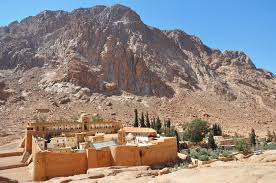
Know the Living God personally now! God is a Person, not a Force. He specializes in one-on-one relationships with people. We are all accountable to Him.
"For it is written: 'As I live, says the Lord, Every knee shall bow to Me, And every tongue shall confess to God.' So then each of us shall give account of himself to God. (Romans 14:11-12)
Pay addition to the verbs in the Bible, especially in the New Testament. Yes, Greek verbs are notoriously complex. The translators have been careful. Take for instance the following familiar passage. Notice the verbs that are (in some sense) past tense, not future tense. (The Hebrew prophetic future tense is discussed on our article on Habakkuk.)
As for you, you were dead in your transgressions and sins, in which you once lived when you followed the ways of this world and of the ruler of the kingdom of the air, the spirit who is now at work in those who are disobedient. All of us also lived among them at one time, gratifying the cravings of our flesh and following its desires and thoughts. Like the rest, we were by nature deserving of wrath. But because of his great love for us, God, who is rich in mercy, made us alive with Christ even when we were dead in transgressions—it is by grace you have been saved.
And God raised us up with Christ and seated us with him in the heavenly realms in Christ Jesus, in order that in the coming ages he might show the incomparable riches of his grace, expressed in his kindness to us in Christ Jesus. For it is by grace you have been saved, through faith—and this is not from yourselves, it is the gift of God— not by works, so that no one can boast. For we are God’s handiwork, created in Christ Jesus to do good works, which God prepared in advance for us to do." (Ephesians 2:1-10)
Our present earthly bodies existing in only four dimensions, remain fallen and furthermore, dying. The future resurrection of the dead is a clear tenet of Old and New Testaments. I believe our spirit and soul leave the Old Tent at physical death but immediately enter the ten or more dimensions of the heavenly places. There things are not “ghostly” but more solid and more substantial than anything we know down here. (If this is new to you, please read “The Great Divorce,” by C.S. Lewis.)
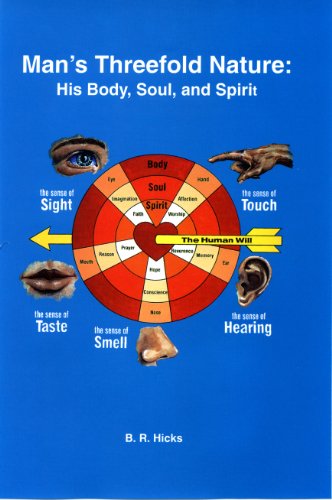
Taking into account the verbs tenses in the NT, every Christian identity and sense of true “self”, should be centered, here and now, “in Christ.”
We are seated now with Jesus, “in the heavenly places.” Some would claim this is positional, not actual. For me, seeing ourselves as God sees us, by faith, makes all the difference in the world, experientially. However, my first pastor, Ralph Kraft, spoke of those who “were so heavenly minded they were of no earthly good.” We all like people who are “down to earth,” or “well-grounded.” As long as we are dwelling in our present bodies, obviously we must avoid getting “high” on the spirit, like some people we know. To repeat the quote from John 4:24, our worship of the living God must be in spirit and in truth. Jesus is of course the truth.
“God is Spirit and those who worship Him must worship in spirit and in truth.” (John 4:24)
Moving on, many professing Christians these days do not know Jesus at all! Jesus spoke of this awful reality,
“Not everyone who says to me, ‘Lord, Lord,’ will enter the kingdom of heaven, but only the one who does the will of my Father who is in heaven. Many will say to me on that day, ‘Lord, Lord, did we not prophesy in your name and in your name drive out demons and in your name perform many miracles?’ Then I will tell them plainly, ‘I never knew you. Away from me, you evildoers!’" (Matthew 7:21-23)
Those who find themselves in the category of outsiders should stop now and surrender to the rule of Jesus in their lives. He will receive you as you are. God does not want your lip service or your beset self-effort on His behalf. He doesn't want you to "try harder" either.
"Don’t forget this fact, dear friends: With the Lord a single day is like a thousand years, and a thousand years are like a single day. The Lord is not slow about his promise, as some people understand slowness, but is being patient with you. He does not want anyone to perish, but wants everyone to repent. But the Day of the Lord will come like a thief. On that day the heavens will disappear with a roaring sound, the elements will be destroyed by fire, and the earth and everything done on it will be exposed." (2 Peter 2:8-10)
The Biblical words, in Hebrew and in Greek for “know” imply deep knowledge. For instance, “Adam knew his wife and she bore a son...” God wants our full attention!
[See The Last One Percent, and Your God is Way Too Small.]
I sense that the majority of professing Christians these days are “soulish” persons whose self-identity is still in the fallen world. This present world, remember, is four dimensional, though immersed, embedded, on all sides, in the invisible world of the “Heavenly Places.” The latter realm probably encompasses at as many as ten dimensions. “Heaven” is not some ethereal realm far behind the stars. Our present universe is surrounded by the spiritual realm. The unseen impacts us every day, but only by trusting God and the Bible can we access much of this. No wonder our eyes and ears, taste and touch sensors have severe limitations. You might say, our present bodies are obsolete technology. Our brains as well. Brains are physical remember? The mind, our conscience, our intuition, and the like, are greater in scope already compared to our physical bodies delimit. Even science admits that all of us are more than physical, biological creatures, whether we know or not.
“Dead in sin,” a Biblical term, does not mean extinct or biologically not breathing, it means not being connected to God who alone has real life. This truth is offensive to our ego. We resist God by marginalizing Him, imagining that we are “self” sufficient, when in fact we are quite helpless. Our resistance to knowing God is related to our pride and our righteousness. “Ego,” by the way, is Latin and also Greek for the personal pronoun “I.” We tend to think of “ego” as referring to the “self.” Self-righteous, self-reliant, self-confident, self-sufficient, and so on. [See The Ego Papers and The Discipleship Papers.]
 "Then Jesus said to His disciples, 'Whoever wants to be my disciple must deny themselves and take up their cross and follow me. For whoever wants to save their life will lose it, but whoever loses their life for me will find it. What good will it be for someone to gain the whole world, yet forfeit their soul? Or what can anyone give in exchange for their soul? For the Son of Man is going to come in his Father's glory with his angels, and then he will reward each person according to what they have done." (Matthew 16:24-27)
"Then Jesus said to His disciples, 'Whoever wants to be my disciple must deny themselves and take up their cross and follow me. For whoever wants to save their life will lose it, but whoever loses their life for me will find it. What good will it be for someone to gain the whole world, yet forfeit their soul? Or what can anyone give in exchange for their soul? For the Son of Man is going to come in his Father's glory with his angels, and then he will reward each person according to what they have done." (Matthew 16:24-27)
Faith is widely misunderstood today. Faith means believing and acting upon what God says is true. God is personal, so above all else, He wants to know each of us person to person. The problem in establishing a one-on-relationship with God is that He is holy (whole) and we are not. This is a hard pill to swallow for many. We like running our own lives and making our own choices—about where we go to college, who we marry, where we live and where we work. If God were a tyrant, our fears might be well-grounded. But God is compassionate and full of mercy. “God is Love,” in fact.
Jesus the unique Son of God—is fully God and fully man. The Trinity is very difficult for us mortals to comprehend. For now, take it from me, God exists eternally as Father, Son, and Holy Spirit. It is the God the Son who became a man, to bridge the chasm between God man, the “Great Gulf Fixed” in Luke 16.
Another impediment to knowing God is that He appears to be a powerful authority figure. He is Omnipotent. But especially, for many of us these days (who perhaps never knew a human dad who was relational), meeting Jesus for the first time is a joyful, blessed experience.
Ray Stedman once said,
“There are many paths to the Messiah. There is only one way to get to God, Jesus said so. Just come to Jesus and He will take you rest of the way.”
 At any rate we are to trust a God who do not see just now. Will he show up when we have humbled ourselves and glimpse the reality that we are all just house guests in His universe?
At any rate we are to trust a God who do not see just now. Will he show up when we have humbled ourselves and glimpse the reality that we are all just house guests in His universe?
Only Two Choices in Life
A hard lesson we all have to learn in life: We are not self-sufficient as persons. We were made to serve. At the root level, we have only the choice of two possible masters in life. We have been misled and deceived by an evil fallen angel, who is the god of the present world order. The illusion he inculcates in us is that we can run our own lives, plan our futures, make daily choices, and control what we become in the world. The default self-image we grow up with does not serve our best interests at all! That path leads to death. Death is not extinction of our consciousness, but everlasting separation from all that is good, beautiful and true. (If this concept is new to you, please read CS Lewis’ The Great Divorce.)
The second choice in life is to chose to surrender to Jesus Christ. This choice does not lead to subjection but to glorious freedom.
So Jesus told those Jews who had believed in him, “If you continue in my word, you are really my disciples. And you will know the truth, and the truth will set you free.” They replied to him, “We are Abraham’s descendants and have never been slaves to anybody. So how can you say, ‘You will be set free’?” Jesus answered them, “Truly, I tell all of you emphatically, that everyone who commits sin is a slave of sin. The slave does not remain in the household forever, but the son does remain forever. So if the Son sets you free, you will be free indeed!” (John 8:31-36 31)
 The New Testament says,
The New Testament says,
“...The wages of sin is death, but the gift of God is eternal life in Christ Jesus our Lord.” (Romans 6:23)
As mentioned earlier, it makes all the difference in the world whether or not we submit all areas of our lives to the Lordship of Jesus. Any areas of compromise we make are unacceptable in the long run. Of course it takes a lifetime to see and know ourselves as we really are. The mighty apostle Paul saw himself as chief among sinners after years of devoted service to Jesus.
"And I thank Christ Jesus our Lord who has enabled me, because He counted me faithful, putting me into the ministry, although I was formerly a blasphemer, a persecutor, and an insolent man; but I obtained mercy because I did it ignorantly in unbelief. And the grace of our Lord was exceedingly abundant, with faith and love which are in Christ Jesus. This is a faithful saying and worthy of all acceptance, that Christ Jesus came into the world to save sinners, of whom I am chief. However, for this reason I obtained mercy, that in me first Jesus Christ might show all longsuffering, as a pattern to those who are going to believe on Him for everlasting life. Now to the King eternal, immortal, invisible, to God who alone is wise, be honor and glory forever and ever. Amen." (1 Timothy 1:12-17)
When any person has fully surrendered to Jesus as Lord, the reality of Galatians 2:20 should hit home.

 "I have been crucified with Christ; and it is no longer I who live, but Christ lives in me; and the life which I now live in the flesh I live by faith in the Son of God, who loved me and gave Himself up for me."
"I have been crucified with Christ; and it is no longer I who live, but Christ lives in me; and the life which I now live in the flesh I live by faith in the Son of God, who loved me and gave Himself up for me."
In other words, Jesus in you is, in a sense, the real new you. He is the inner Light shining through the lanterns of our unique human lives. This reality about our new-found union with Christ, must be lived moment by moment, day by day. God has not overwritten our freedom of choice!
Before we met Jesus we had no real choices. To be “dead in trespasses and sins” meant our sense of right and wrong was incorrect. We were unresponsive to God and even from our consciences until Jesus set us free.
Do not love the world or anything in the world. If anyone loves the world, love for the Father is not in them.
For everything in the world—the lust of the flesh, the lust of the eyes, and the pride of life—comes not from the Father but from the world.
The world and its desires pass away, but whoever does the will of God lives forever." (1 John 2:15-17 15)
All I have been writing is nothing new. It seems to me to be forgotten truth which needs to be rediscovered. While seeking ways to shed light on what I hoped to clarify above, but may have obscured, please read Ray Stedman’s 1963 message “Standing While Running,”
Way back then, I remember well a Saturday morning in 1965 when Ray picked me up at my home and drove me to Mission Springs Conference Center near Santa Cruz, California. We joined a mens’ retreat group featuring a very ordinary speaker, Norman Grubb. Grubb was so ordinary, I thought that he had been invited by mistake. But as I listened I soon changed my mind.
 I hastened to read his books in the ensuing weeks. He wrote about “The Liberating Secret” and “The Exchanged Life.” Much of what he said was about Galatians 2:20. (That verse has been my verse since my earliest days as a follower of Christ). Recently I discovered a fine teacher who follows this teaching. See Theliberatingsecret.org. Many of Norman Grubb’s messages may be found on Sermonaudio.com.
I hastened to read his books in the ensuing weeks. He wrote about “The Liberating Secret” and “The Exchanged Life.” Much of what he said was about Galatians 2:20. (That verse has been my verse since my earliest days as a follower of Christ). Recently I discovered a fine teacher who follows this teaching. See Theliberatingsecret.org. Many of Norman Grubb’s messages may be found on Sermonaudio.com. 
I was greatly moved (also back then) by a week-long visit to PBC by Major Ian Thomas of Torchbearers in England. Much of what Ian Thomas said is available on line. I especially liked the content of his audio messages.
Finally, may I encourage all of you to soak in the Bible? I believe This book is fully inspired, God’s Word to mankind.
We are living in a time of great Bible illiteracy!
Life is short! There are wrong answers on every side. Your fellow professing Christians may, in real life, be lackluster. their outer appearance\e may be misleading.
Since then you were raised with Christ, seek those things which are above, where Christ is, sitting at the right hand of God. Set your mind on things above, not on things on the earth. For you died, and your life is hidden with Christ in God. When Christ who is our life appears, then you also will appear with Him in glory.
Therefore put to death your members which are on the earth: fornication, uncleanness, passion, evil desire, and covetousness, which is idolatry. Because of these things the wrath of God is coming upon the sons of disobedience, in which you yourselves once walked when you lived in them. But now you yourselves are to put off all these: anger, wrath, malice, blasphemy, filthy language out of your mouth. Do not lie to one another, since you have put off the old man with his deeds, and have put on the new man who is renewed in knowledge according to the image of Him who created him, where there is neither Greek nor Jew, circumcised nor uncircumcised, barbarian, Scythian, slave nor free, but Christ is all and in all." (Colossians 3:1-11)


How Saved Are You?
Cultural Christians
Rebellious But Religious
The Excluded Ones
The Left Behind
King Ego
The Exchanged Life
Coming Soon
The Consequence Engine
The True and the False
Christ in You
The Flesh, The World, The Devil
Arrested Emotional Development
Almighty Father
I Sing the Mighty Power of God
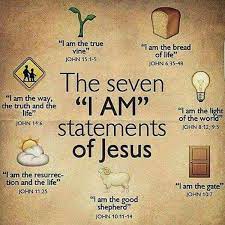
Just as I am, without one plea
But that Thy blood was shed for me
And that Thou bid'st me come to Thee Just as I am,
though tossed about With many a conflict, many a doubt
Fighting and fears within without O Lamb of God,
I come, I come Just as I am, and waiting not to rid my soul of one dark blot
O Lamb of God, I come, I come.
![]()
Lambert Dolphin


Original Newsletter Version (4/16/18)